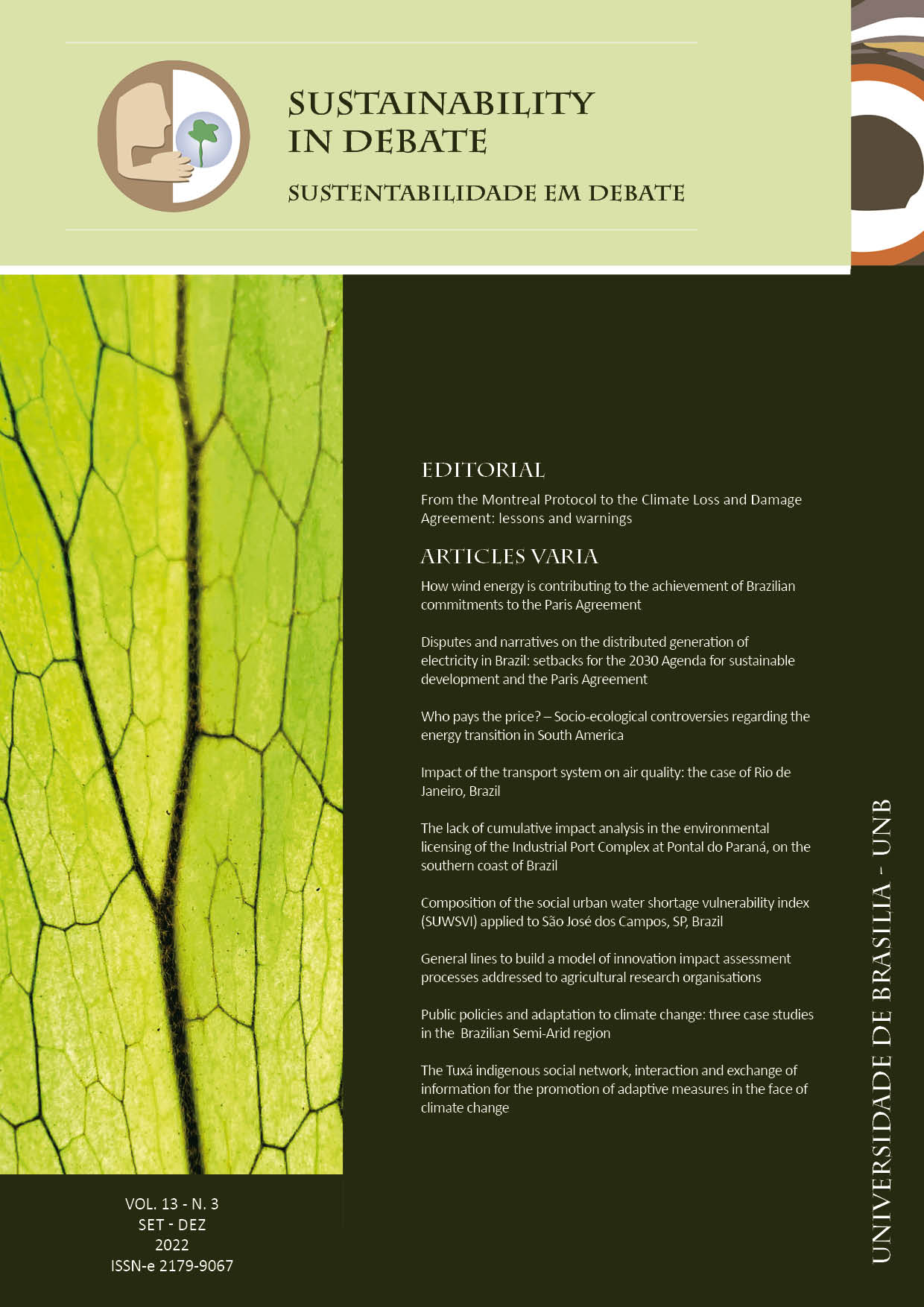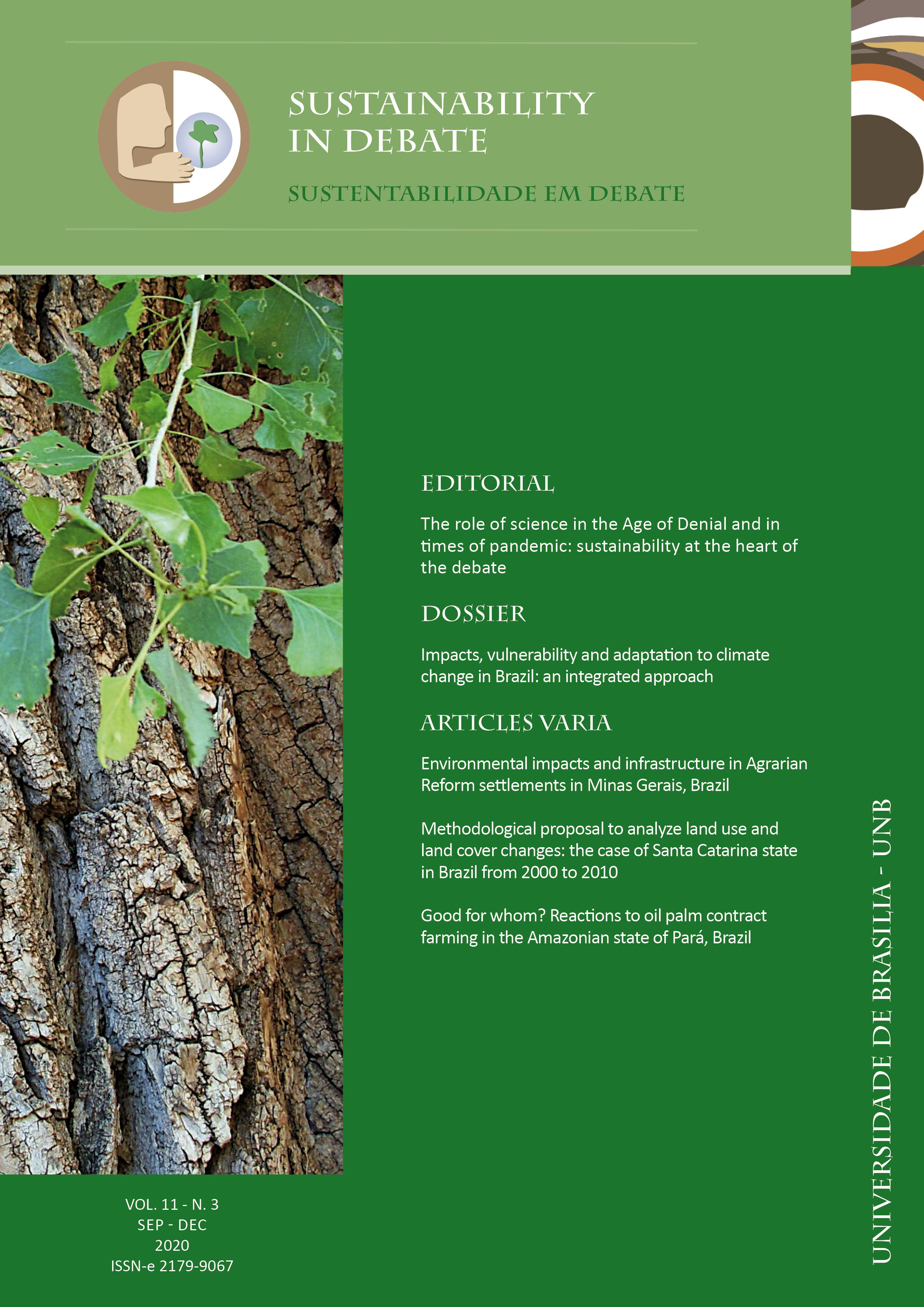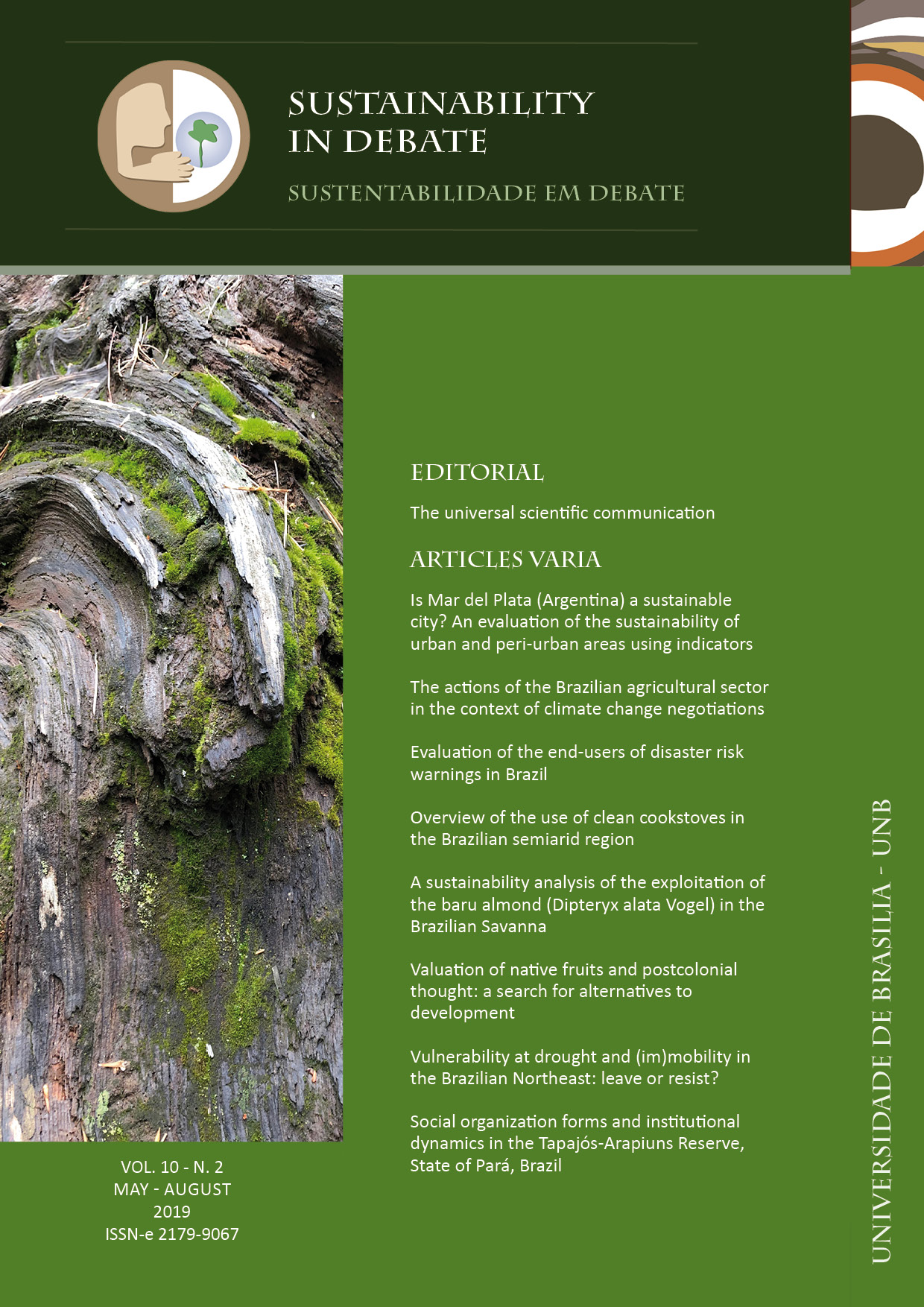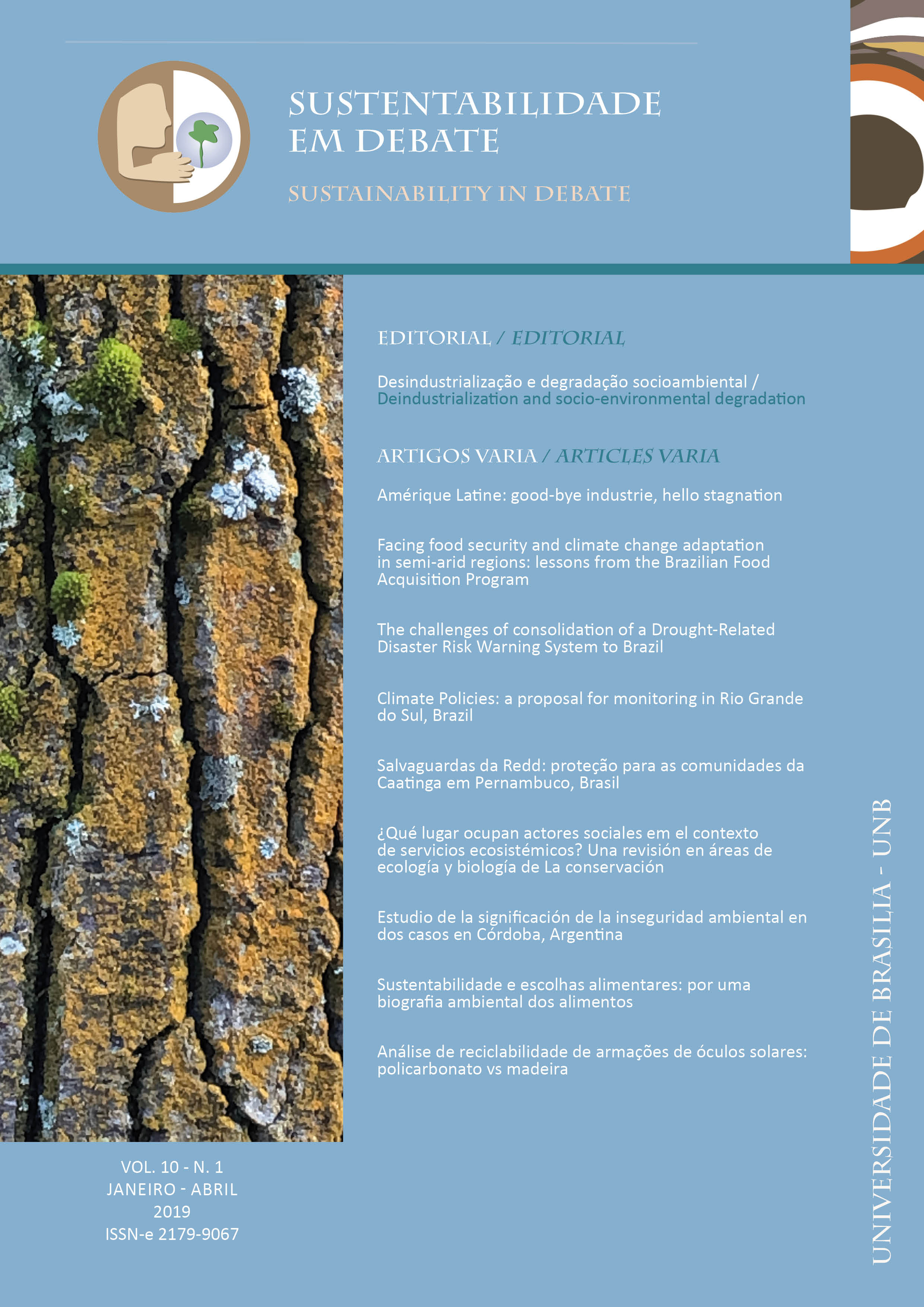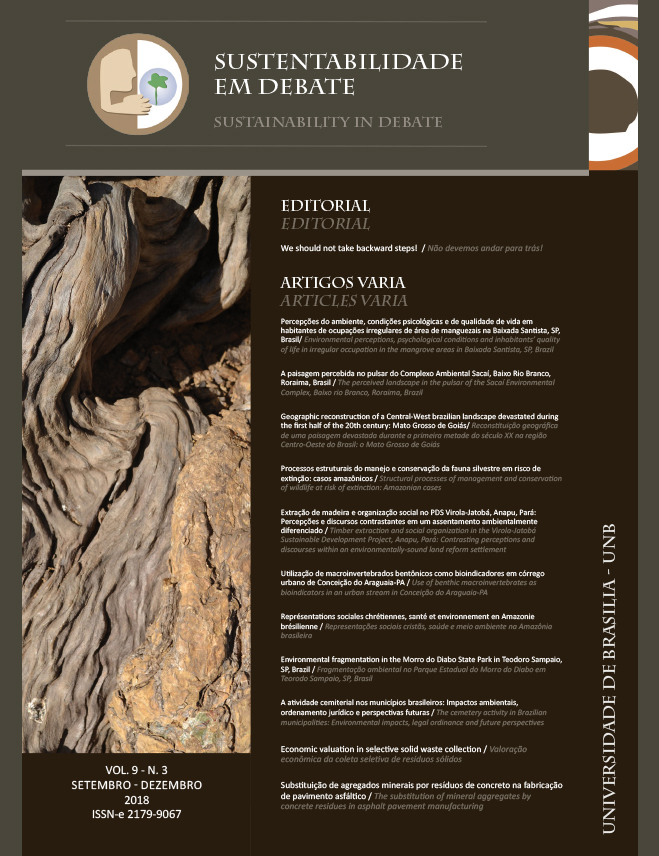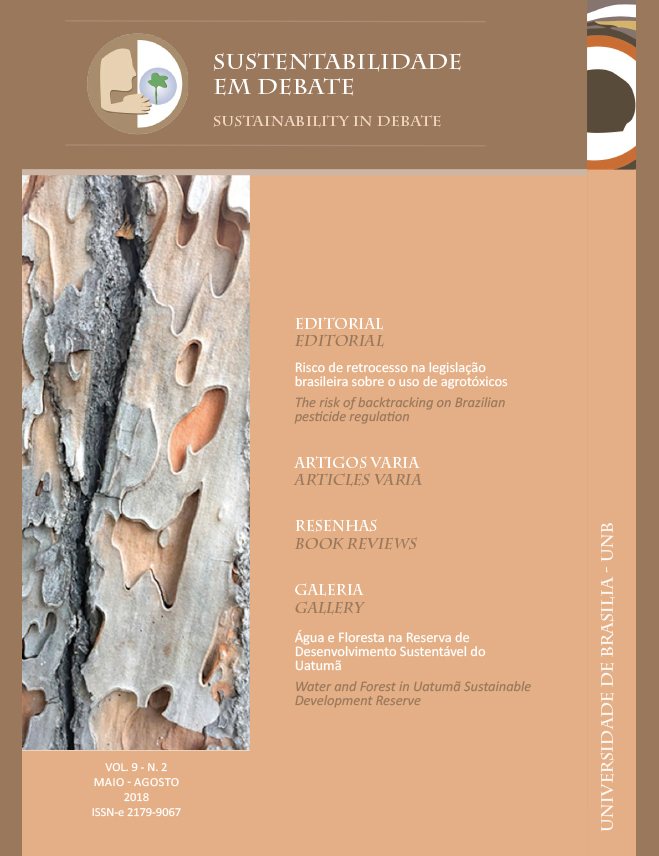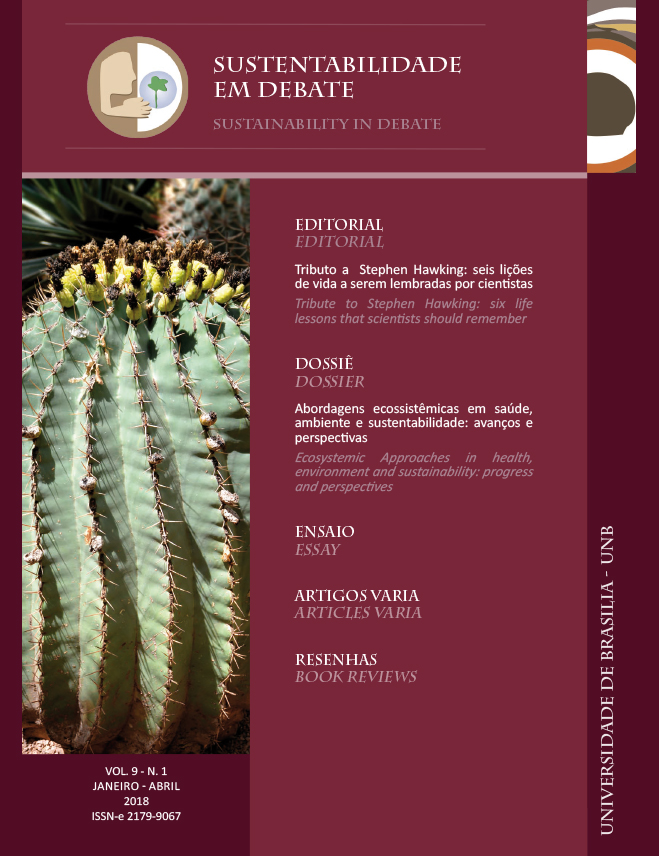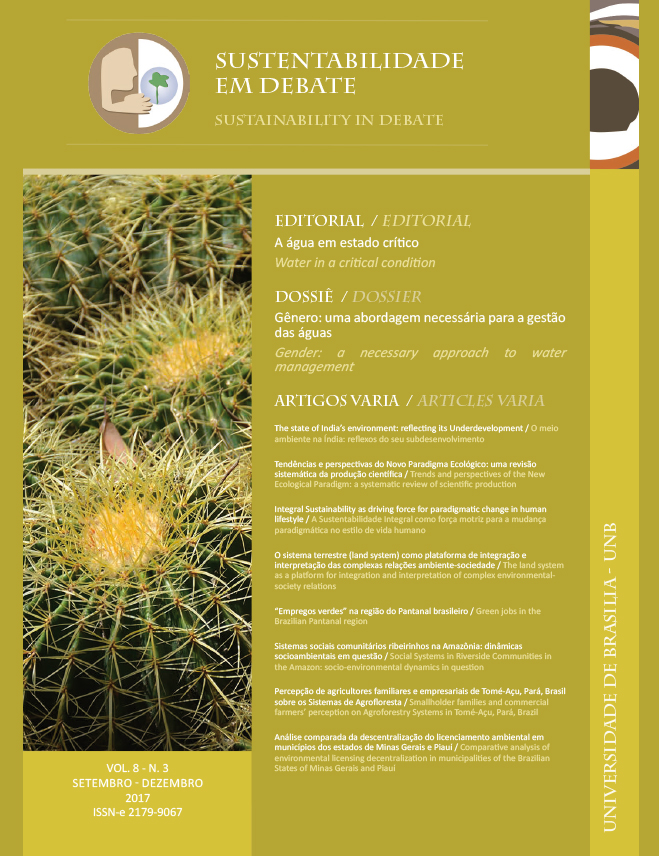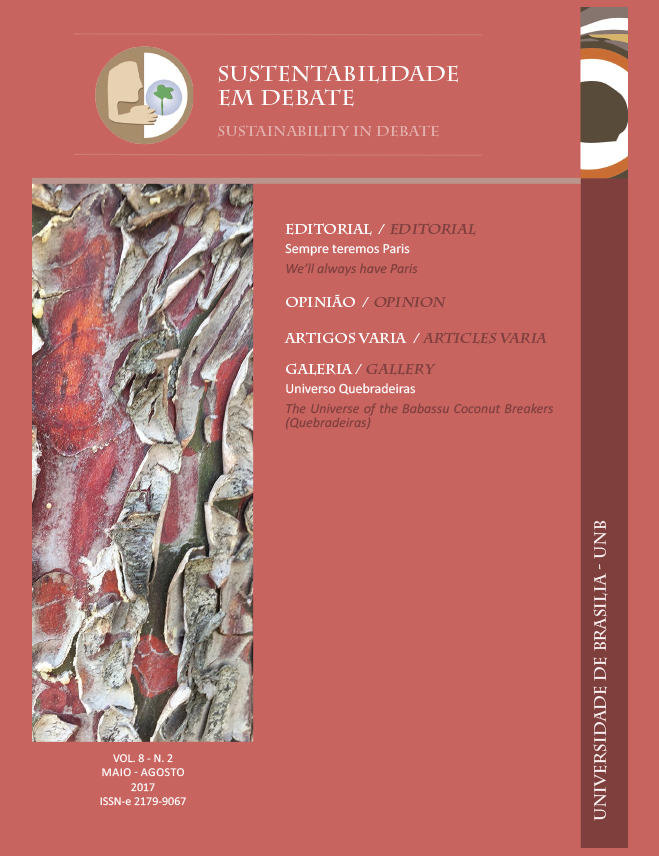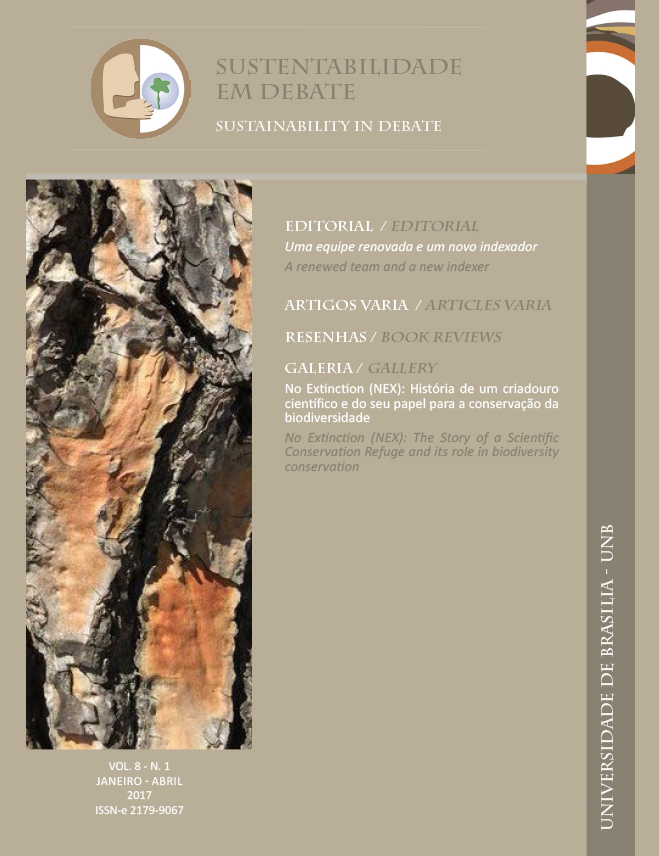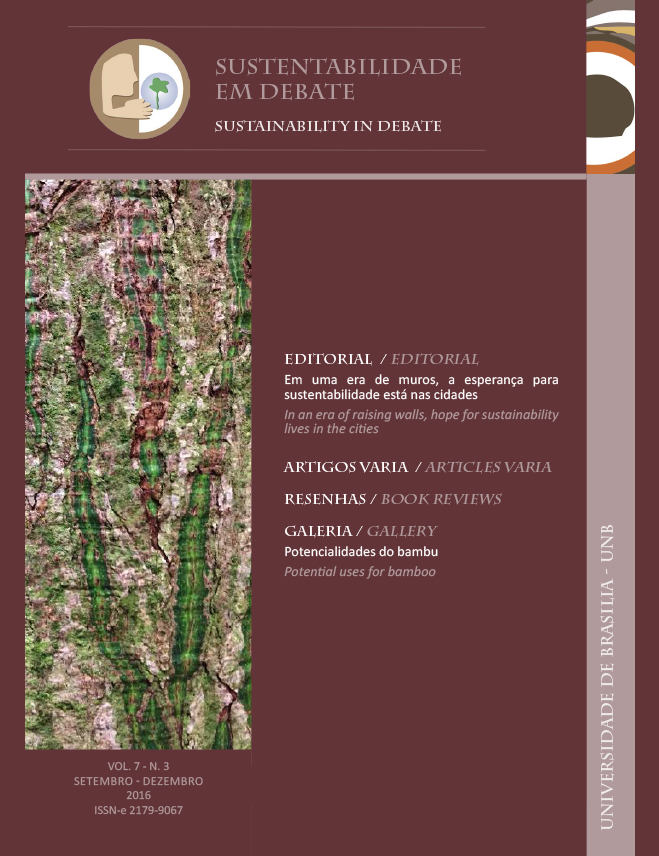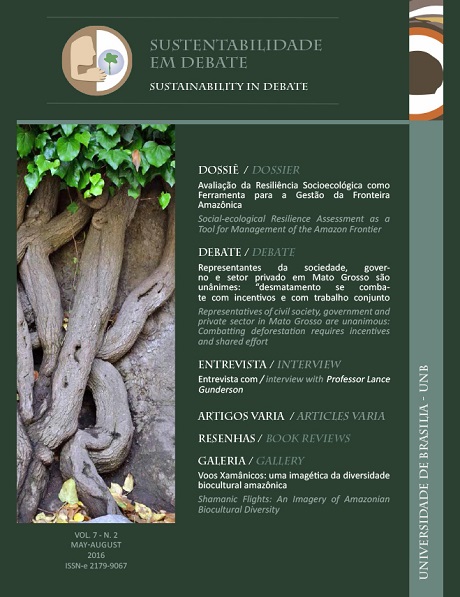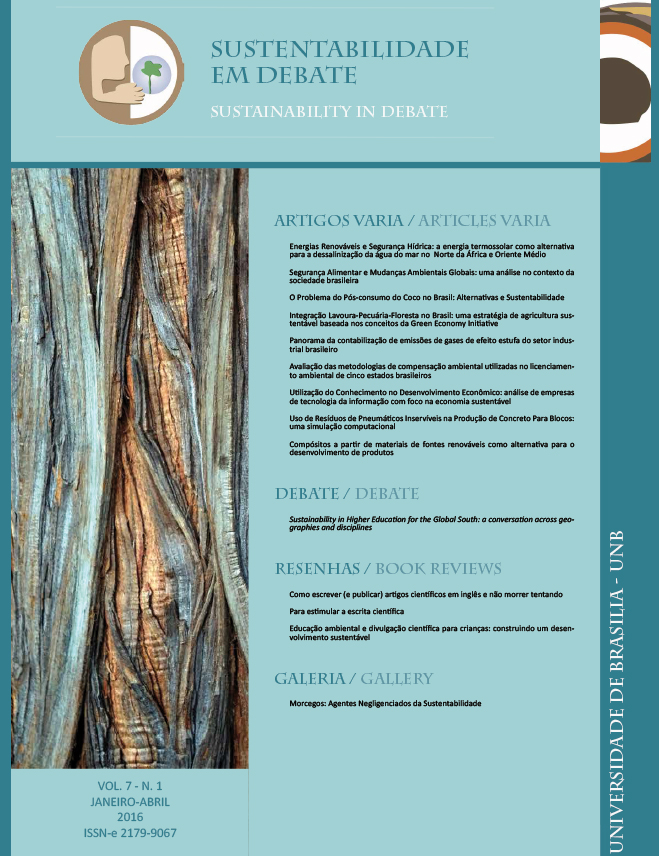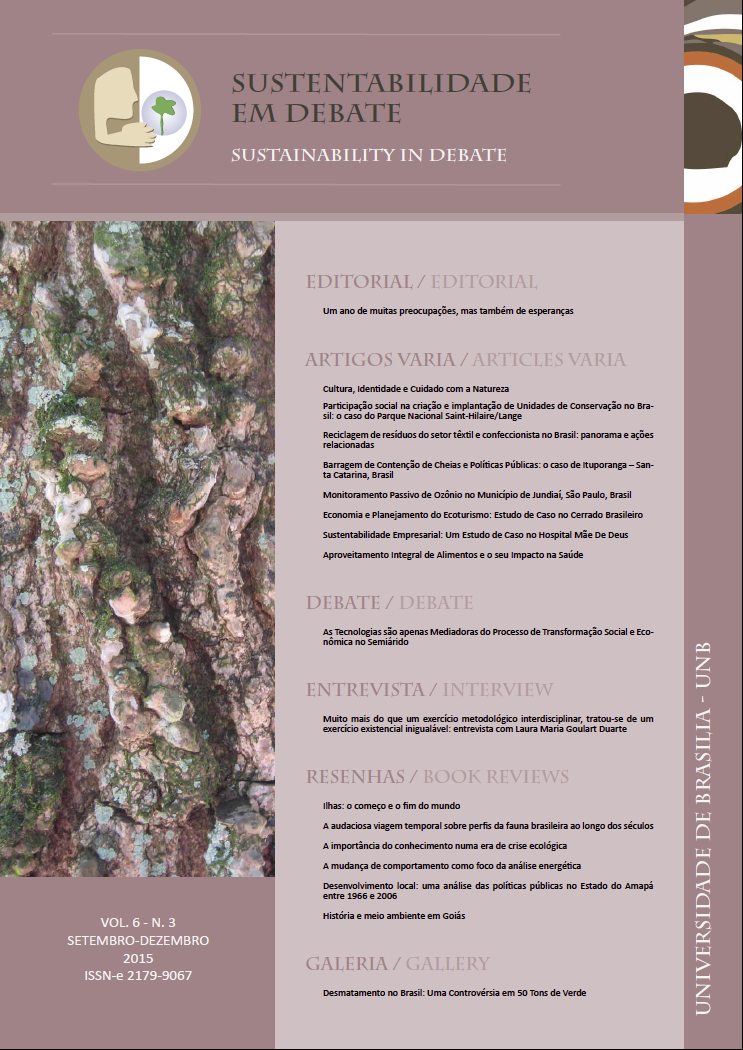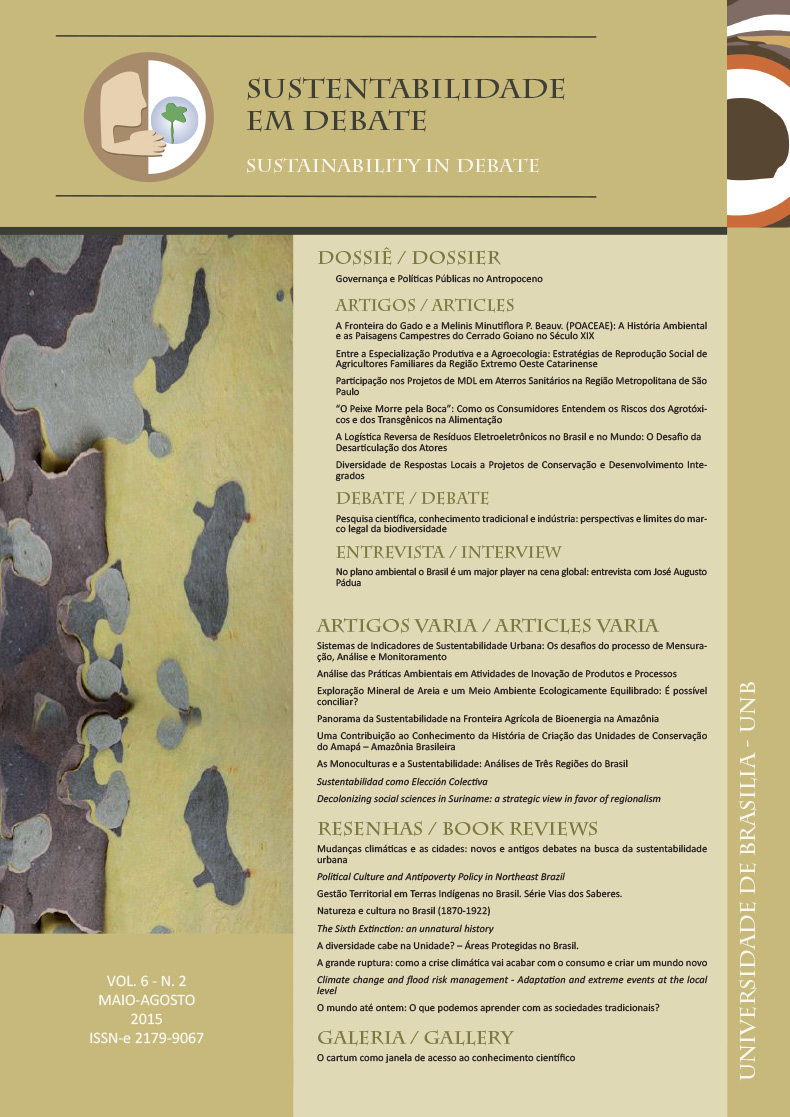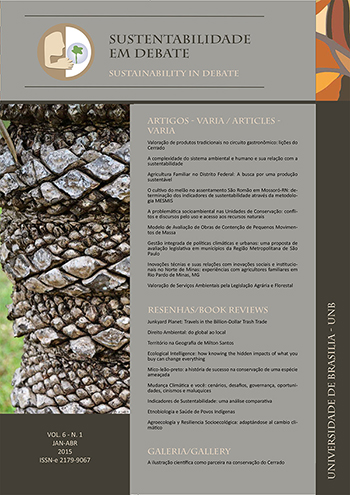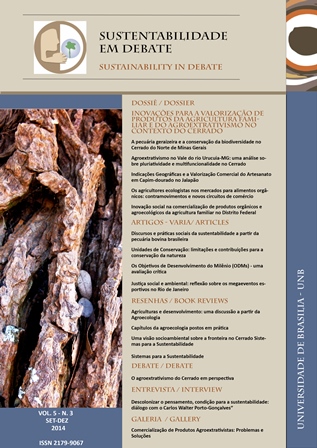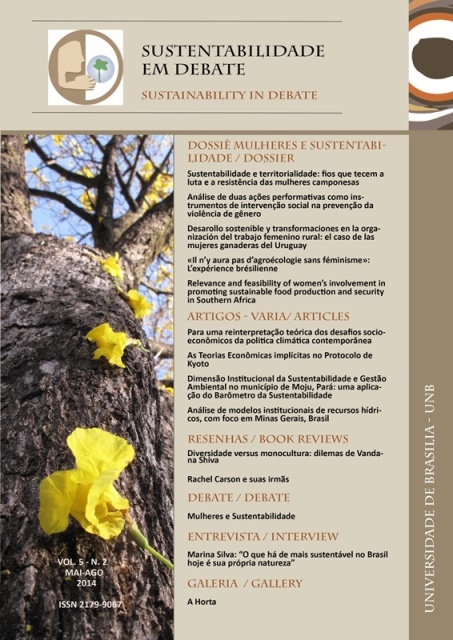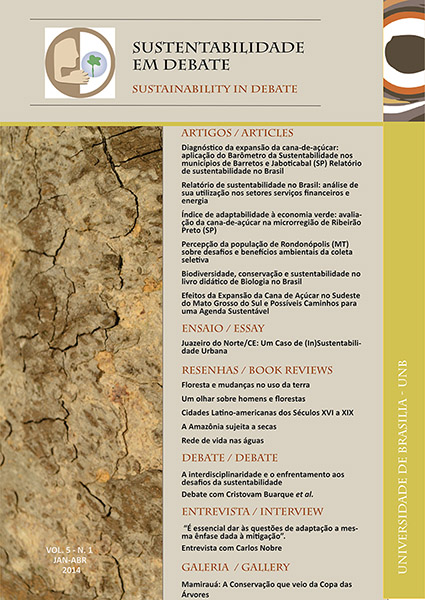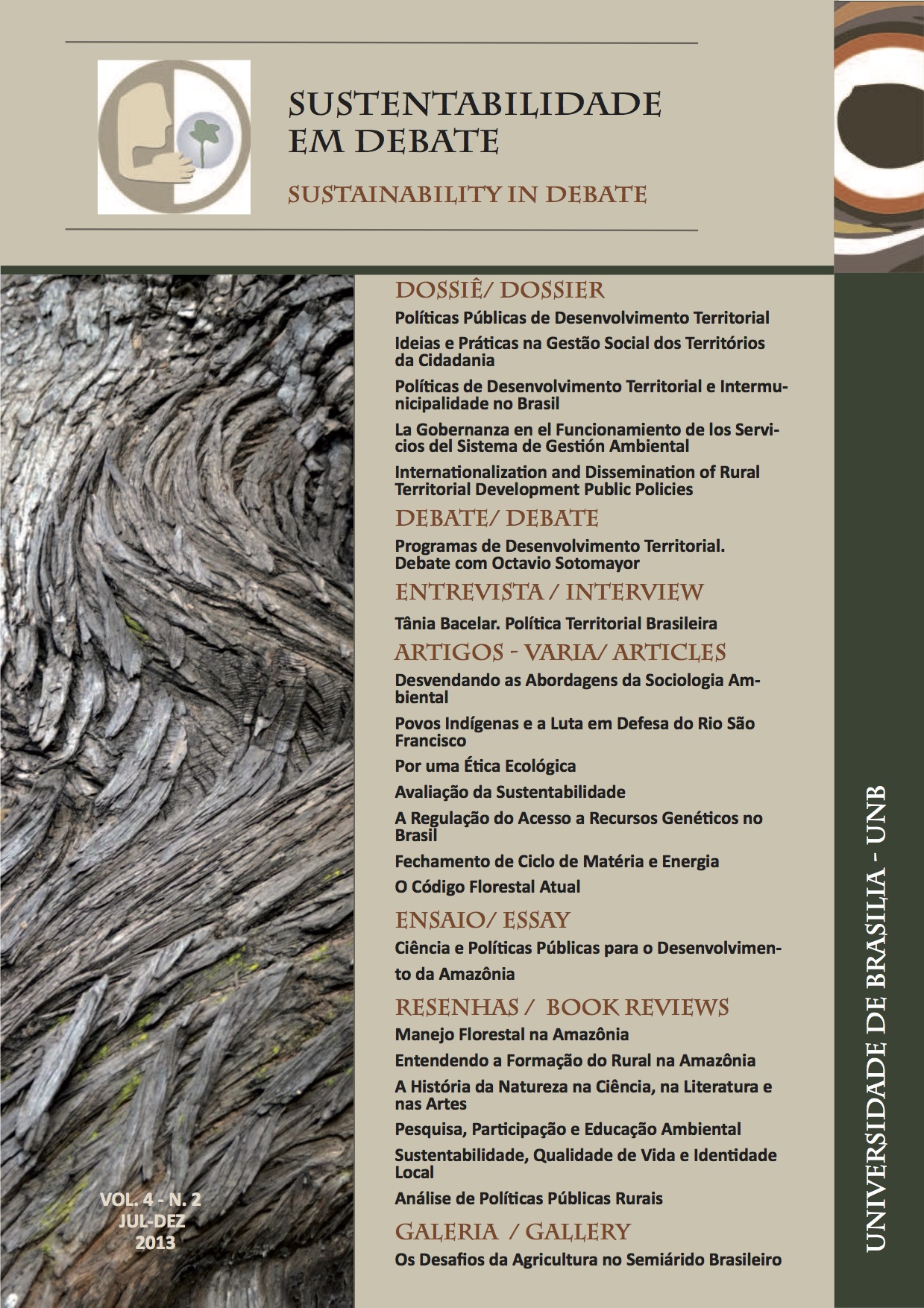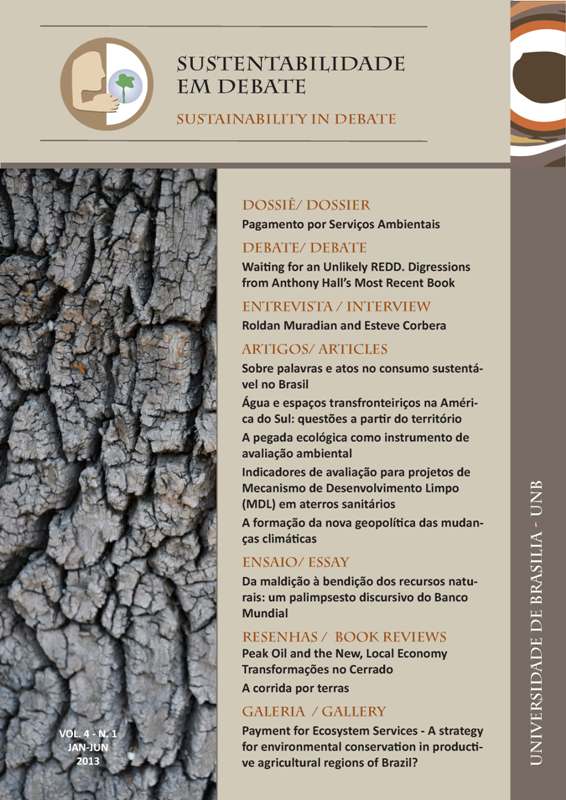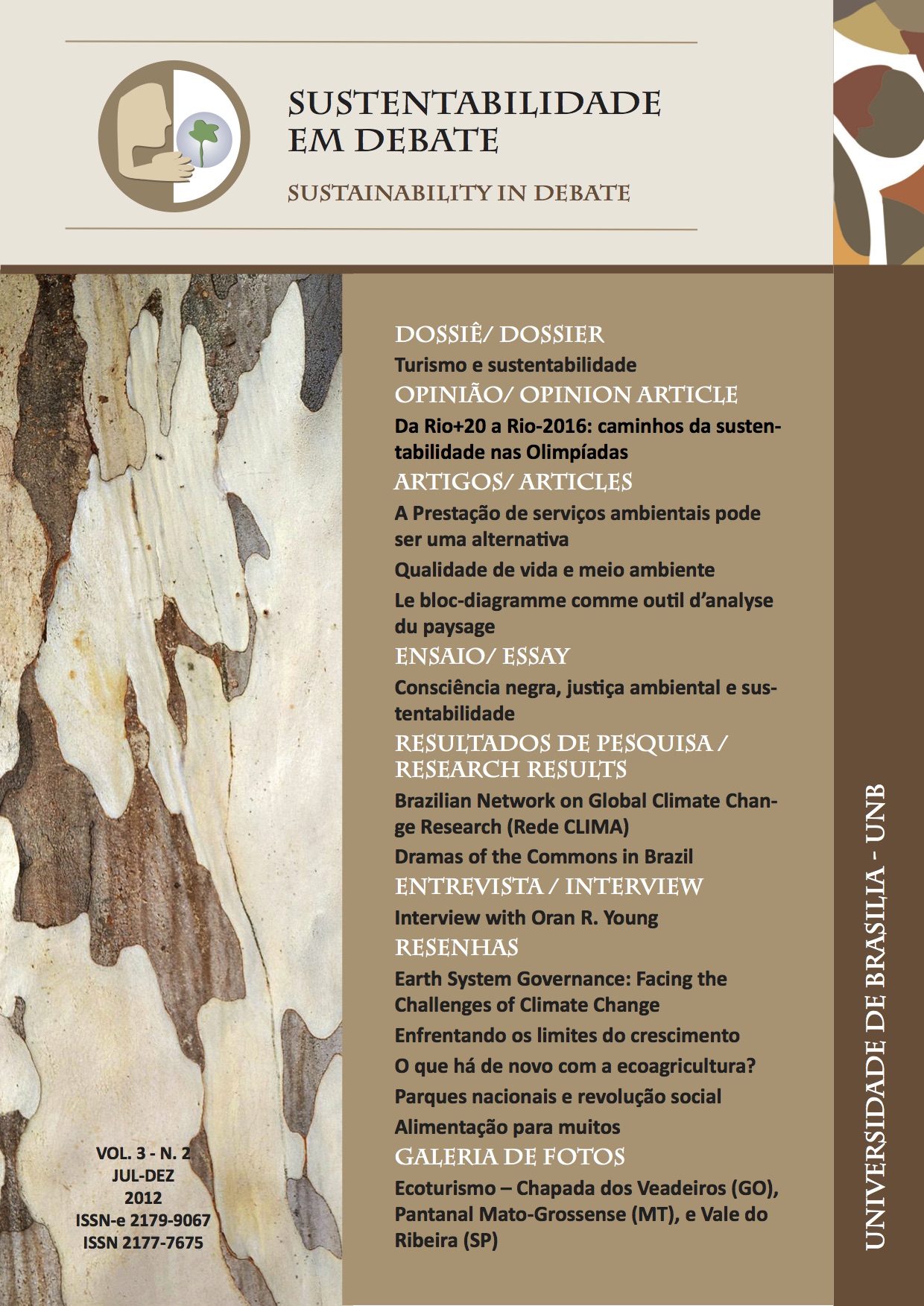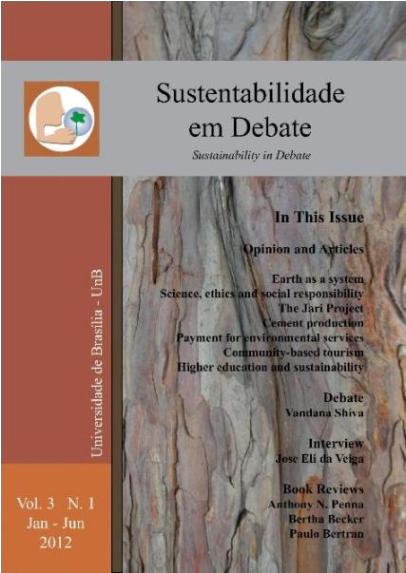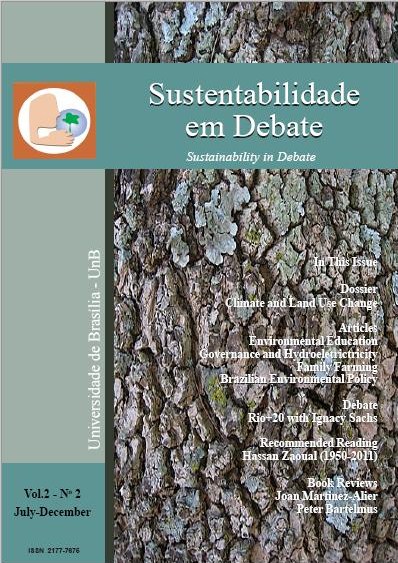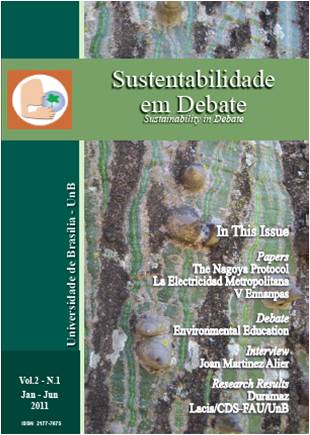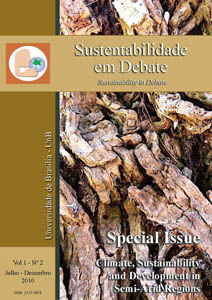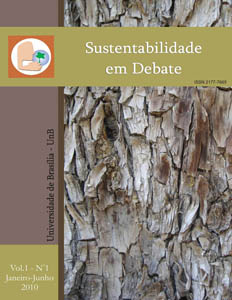Archivos
-
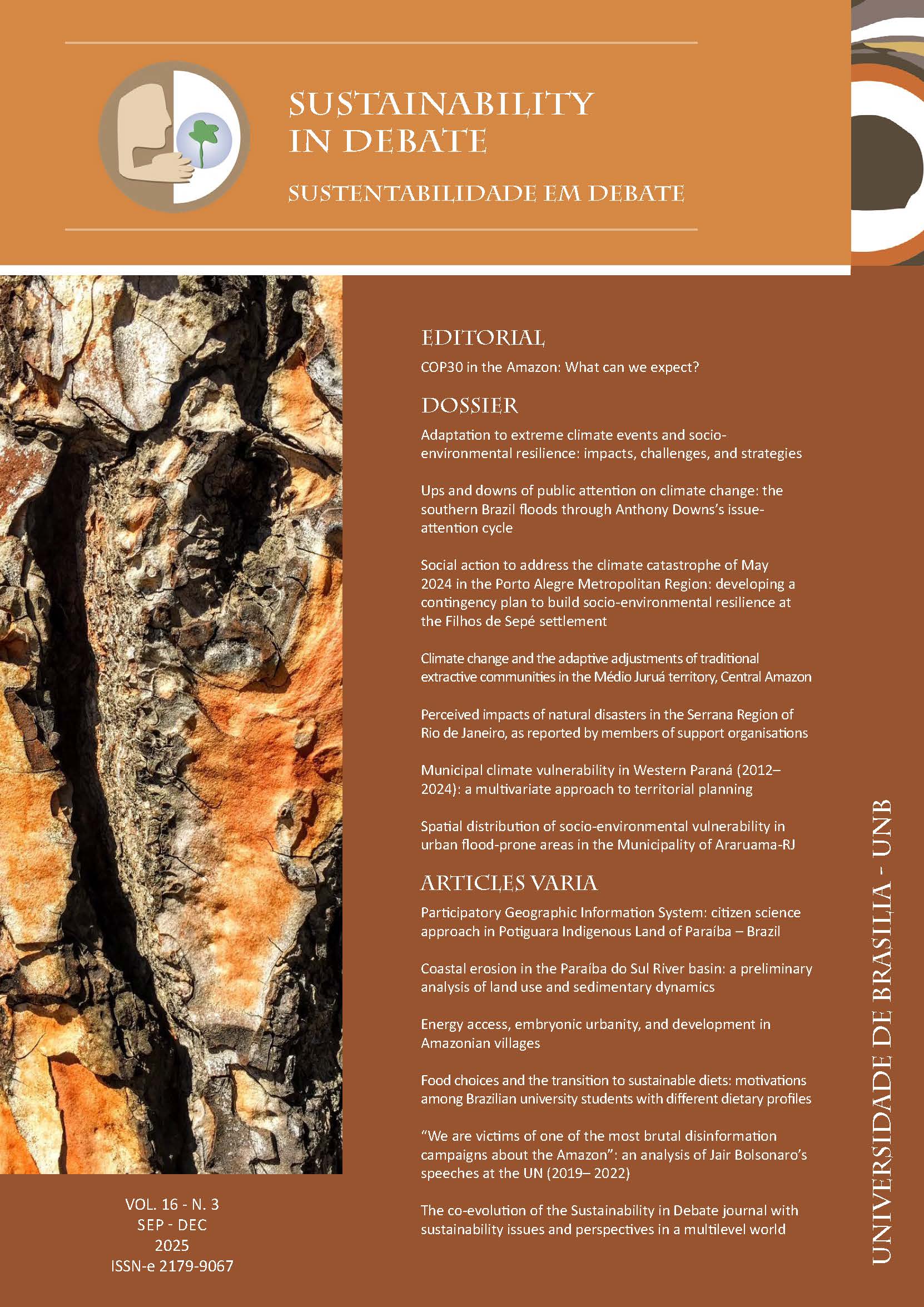
Sustainability in Debate
Vol. 16 Núm. 3 (2025)In this last edition of 2025, Sustainability in Debate reaffirms its commitment to science and to critical engagement with the climate crisis in a context marked by socio-environmental inequalities, political disputes and institutional fragility. It is not possible to address the climate crisis without simultaneously confronting socioenvironmental inequalities, governance deficits and the weakening of public institutions.
Centred on the Dossier “Adaptation to Extreme Climate Events and Socio-Environmental Resilience: Impacts, Challenges, and Strategies”, this issue brings together studies addressing climate risks, vulnerabilities, public policies, local practices and institutional innovations across different regions of Brazil. The Varia section broadens the discussion by engaging with themes such as energy, territory, participatory science, political discourse and the journal’s own trajectory.
In a moment when prevention is fairer and less costly than remediation, Sustainability in Debate reasserts its defence of science, cooperation and intergenerational responsibility
-

Sustainability in Debate
Vol. 16 Núm. 2 (2025)In this second edition of 2025, governance and environmental policies are highlighted, with Lucena and Zakia analysing CONAMA Resolution No. 507/2024 on Caatinga forest management, and Silvino et al. examining governance narratives in Brazilian environmental arenas. Corporate and territorial sustainability is addressed in Kanda and Bandeira’s critique of Natura S.A.’s 2020–2023 sustainability reports, and in Santos and Lucas’ application of agrarian diagnostics and the MESMIS method in Pará, revealing low social and environmental indices but resilience in family labour and diversification. Social and environmental justice issues are also discussed: Polidoro and Oliveira propose the Housing Deficit Index (HDI), exposing regional, urban, and racial inequalities; Sentilles et al. examine the community response to the 2019 oil spill in Bahia; and Cazeiro et al. analyse the “necropolitics of the winds” in Pernambuco, highlighting mental health impacts from wind farms. The integration of knowledge, food, and livelihoods is explored by Oliveira et al., through climate dialogues in Novo Airão, and by Buôgo et al., who assess 23 sustainable diet recommendations. Finally, the links between nature, culture, and conservation emerge in Teles et al.’s study of sustainable tourism narratives on Instagram among Hispanic centennials, and in Gemim et al.’s documentation of 350 species in Ribeira Valley agroforests, emphasising food security and ethnoconservation.
-

Sustainability in Debate
Vol. 16 Núm. 1 (2025)This issue of Sustainability in Debate brings together nine articles addressing urgent and diverse sustainability challenges, with a focus on socio-environmental conflicts, productive inclusion, health, urban mobility, food systems, and technological innovation.
Three articles explore the territorial and social impacts of extractive activities: the weakening of environmentalism in Brazil, the effects of mining on rental prices in Ouro Preto (MG), and the social tensions caused by lithium exploitation in Peru. Others examine inclusive and sustainable alternatives, such as rural innovation niches in the Brazilian Northeast and the coexistence of hegemonic and peripheral healthcare systems.
Urban and consumption-related issues are tackled through studies on medication disposal in Araçatuba (SP), urban mobility challenges in João Pessoa (PB), and the environmental footprints of Brazilian adolescents' diets. The issue closes with a contribution on the role of artificial intelligence in strengthening the sustainability of agri-food value chains in Africa.
-
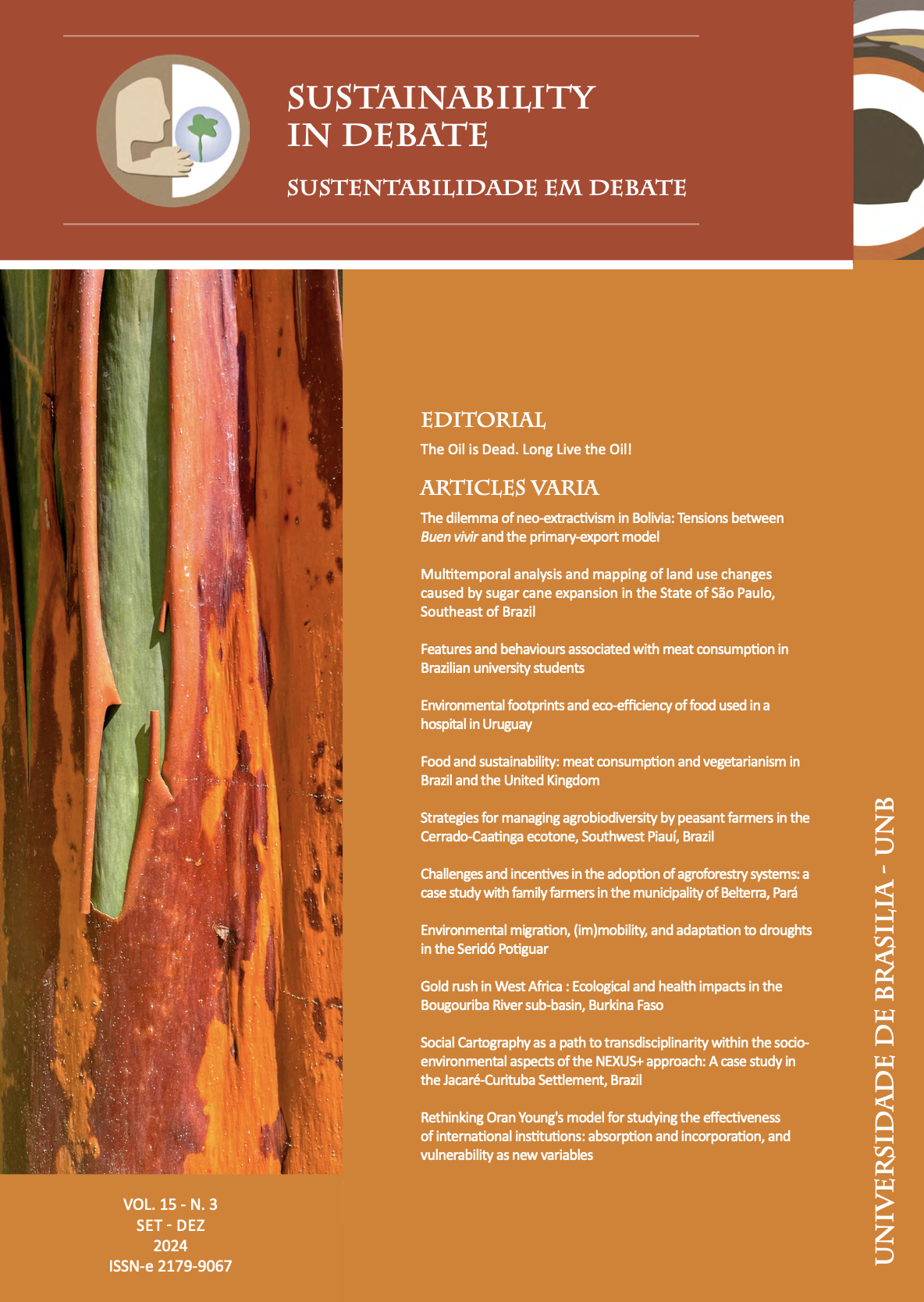
Sustainability in Debate
Vol. 15 Núm. 3 (2024)In this last edition of 2024, Sustainability in Debate highlights critical intersections of environmental sustainability, governance, and societal adaptation. Capri and Baptista critique Bolivia’s neo-extractivist policies, balancing social gains with environmental conflicts, while Ronquim et al. address sugarcane expansion in São Paulo and its ecological trade-offs. Food systems emerge as a central theme, with Triches et al., Strasburg, and Wolstenholme et al. exploring the environmental impacts of meat consumption and dietary shifts in Brazil, Uruguay, and the UK. Resilience in agriculture is highlighted by Sousa et al., who document agroecological practices in Brazil’s Cerrado-Caatinga ecotone, and Pauletto et al., who analyse agroforestry adoption in Pará. The edition also addresses human and institutional responses to crises, including Correia’s study on drought-induced migration in Brazil, Soma’s examination of artisanal gold mining in Burkina Faso, and Bernal et al.'s use of social cartography to map vulnerabilities in Sergipe. Concluding the edition, Sanches proposes enhancements to Oran Young’s model of international governance, addressing state capacities and vulnerabilities to global challenges.
-
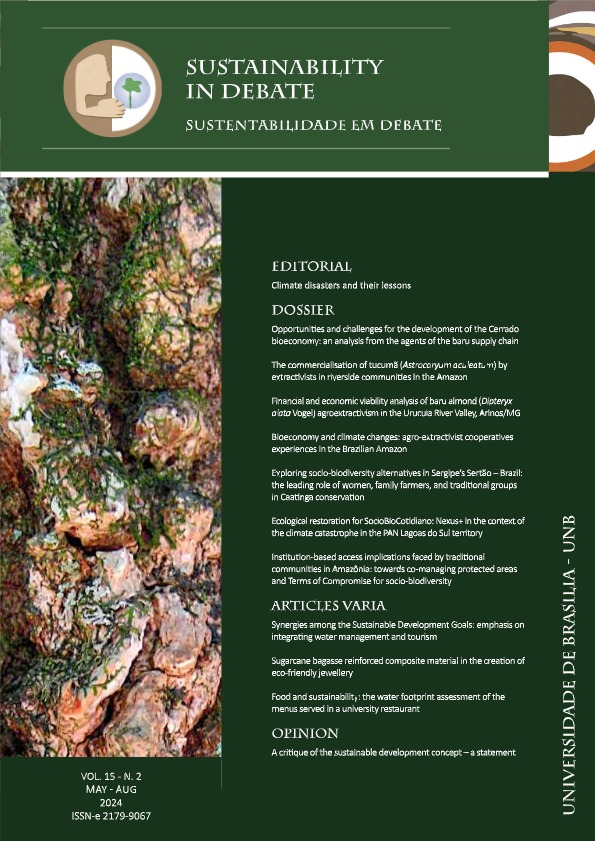
Sustainability in Debate
Vol. 15 Núm. 2 (2024)In this second edition of 2024, Sustainability in Debate, in its editorial, discusses the socioeconomic and environmental potential linked to socio-biodiversity products in different contexts and regions, featuring seven articles, three in the Varia section and an Opinion work.
As part of the Dossier, Burgos & Mertens discuss opportunities and challenges for developing the baru nut supply chain in the Cerrado. Silva et al. present research findings on the marketing channels for tucumã in the Amazon. Valadão & Souza analyse the financial and economic viability of baru nut agro-extractivism in Minas Gerais, and Nascimento et al. explore bioeconomy and climate change, shedding
light on the experiences of agro-extractive cooperatives in the Amazon. Menezes & Silva provide an analysis of the socio-biodiversity dynamics of the Caatinga in the Sergipe backlands, and Coelho-de-Souza et al., in the context of Rio Grande do Sul, discuss ecological restoration as a strategy to achieve water, energy, food, and socio-environmental security. Finally, Cunha investigates how institutions reshape access to natural resources and markets for Quilombola communities in the Rio Trombetas Biological Reserve (PA).In the Varia section, Nascimento et al. explore the synergies between water management and tourism by analysing the Sustainable Development Goals. Batista & Dias examine the relationship between the Water Footprint and the sustainability of menus developed by the Federal Institute of Piauí at the university restaurant. Souza et al. present a sugarcane bagasse composite development for eco-friendly jewellery creation. Finally, in his Opinion article, Drummond critiques the concept of sustainable development, highlighting logical, ethical, and scientific inconsistencies in addressing socio-environmental issues.
-
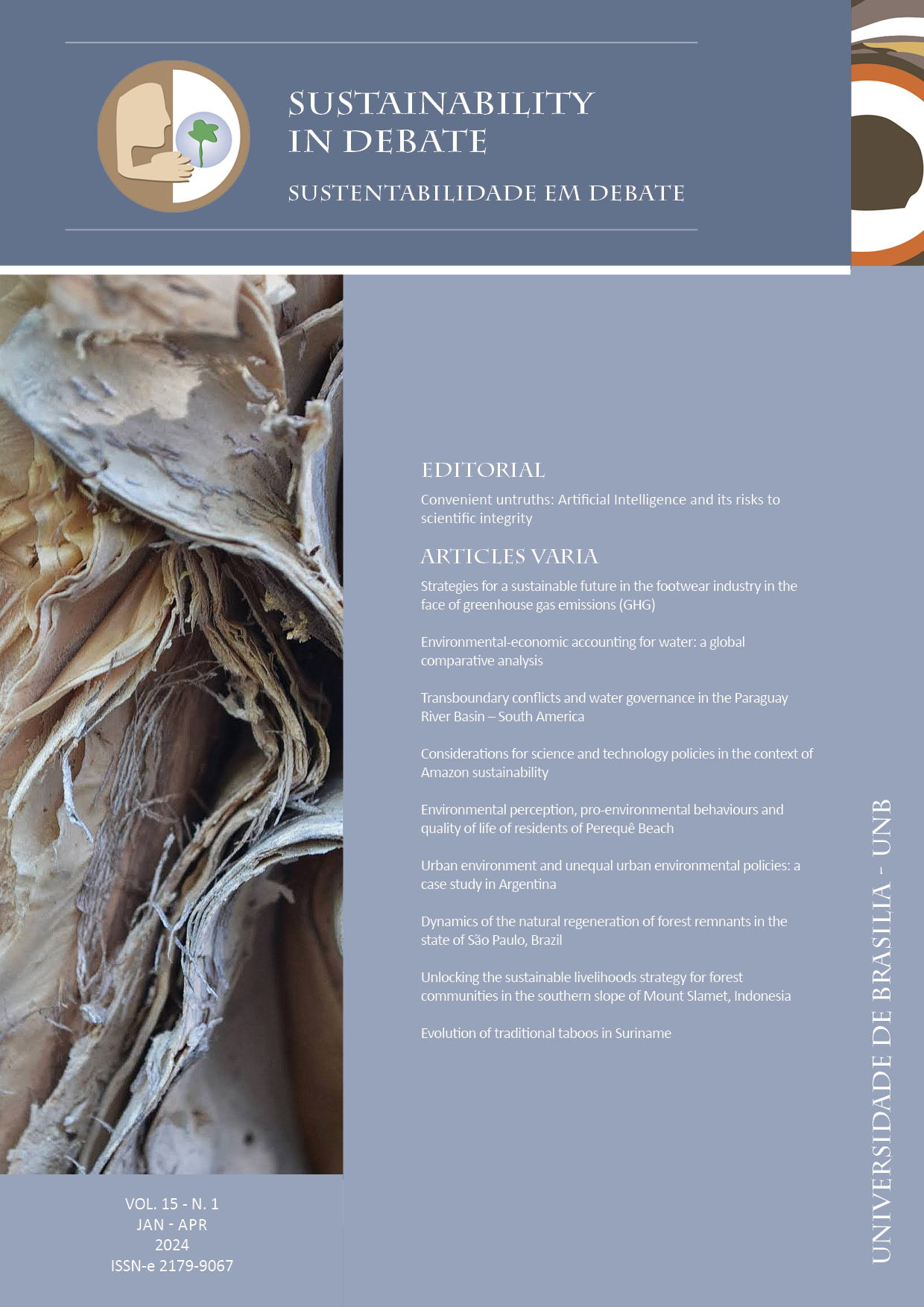
Sustainability in Debate
Vol. 15 Núm. 1 (2024)In this first issue of 2024, Sustainability in Debate, in its editorial, reflects on the responsibility of scientific journals and the community of authors, reviewers, and readers in its field of interest in the AI era.
Firstly, Fagundes and Schreiber discuss the main greenhouse gas emissions (GHG) sources in the Brazilian footwear industry. Following this, Meurer and van Bellen analyse how countries disclose their environmental-economic accounting for water through the SEEA- Water methodology. Barbosa and Ribeiro present an analysis of water conflicts and the governance structure of the Paraguay River Basin (South America). Monteiro et al. provide an overview of Science and Technology in the Amazon, discussing the role of various institutions and addressing the challenges of mobilising them for sustainable territorial development. Oliveira-Monteiro et al. assess the environmental perception, pro-ecological behaviours, and quality of life of the caiçara community of Praia do Perequê, located in Guarujá (SP). Lastly, Brites analyses the different environmental urban problems in the city of Posadas (Argentina). Ronquim et al. discuss the main factors favouring the regeneration of native vegetation in two regions of the state of São Paulo, while Budiyoko et al. investigate sustainable livelihood strategies of communities in the Monte Slamet region in the Central Java Province, Indonesia. Finally, Menke and Menke discuss traditional taboos present in Suriname in the context of the recent convergence of various groups in the capital Paramaribo and surrounding areas.
-
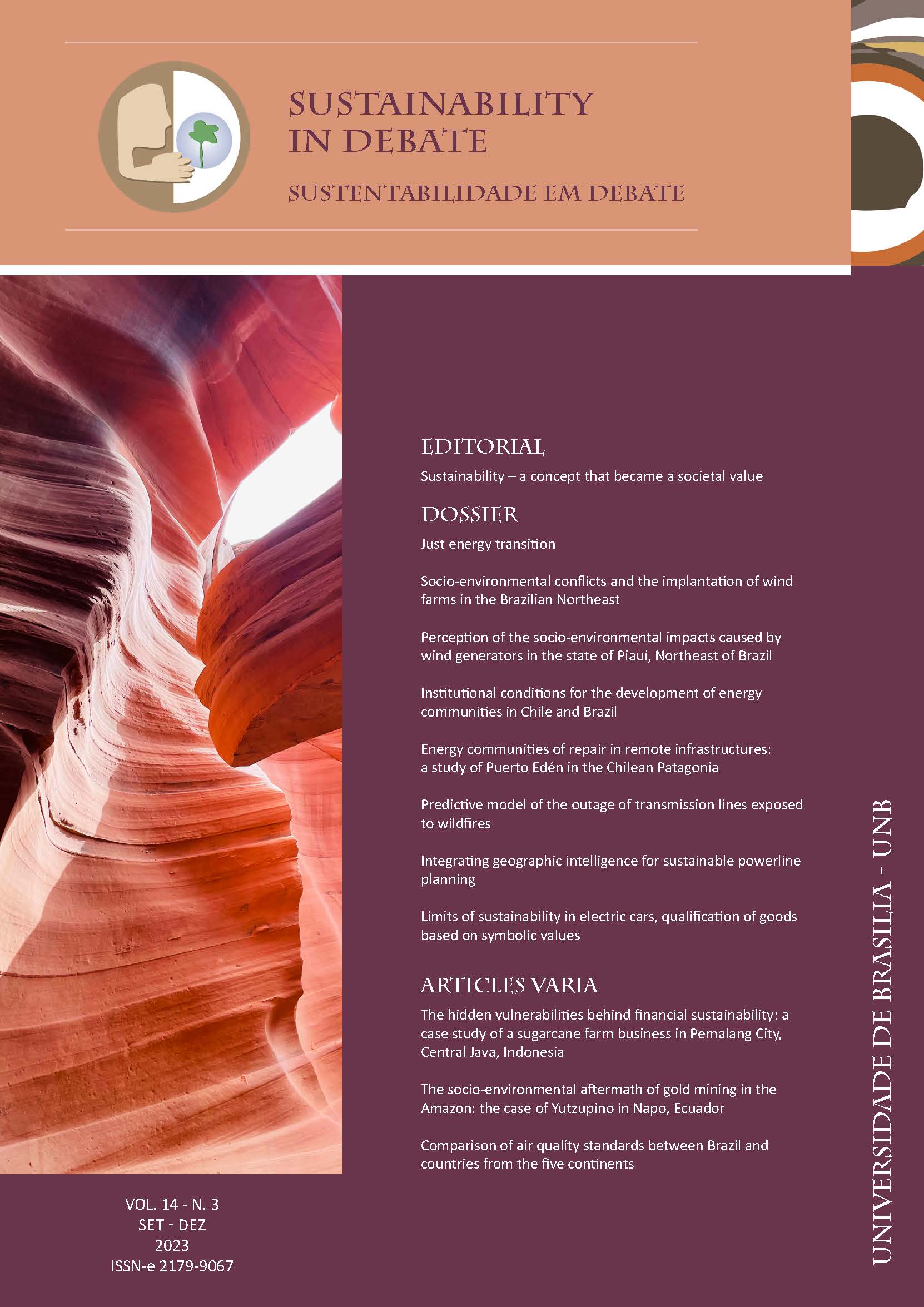
Sustainability in Debate
Vol. 14 Núm. 3 (2023)Nesse último número de 2023, Sustainability in Debate, em seu editorial, faz uma reflexão sobre o conceito de Sustentabilidade, e a sua mudança para um valor que hoje diz respeito a toda a sociedade. Na sequência, SiD publica dez artigos, sete no Dossiê “Transições Energéticas Justas” e três na seção Varia. Primeiramente, Paulino et al. discutem os avanços da energia eólica no Nordeste com foco nos conflitos socioambientais, seguido por Araújo e Gorayeb que abordam o problema da aceitação social dos geradores eólicos e a percepção sobre injustiças por parte de uma comunidade. González et al. discorrem sobre arranjos institucionais relacionados ao avanço das “comunidades energéticas”, e Baigorrotegui et al. abordam os problemas de manutenção da rede de energia em Puerto Edén (Chile). Costa et al. dialogam sobre o papel das linhas de transmissão para a promoção do acesso às fontes renováveis, Araújo et al. debatem sobre a aplicabilidade da modelagem espacial no planejamento locacional de projetos de transmissão, e Wolffenbüttel discorre sobre como os indivíduos mobilizam certos valores para a aquisição de automóveis elétricos. Na seção Varia, Zulkifli et al. apresentam um estudo de viabilidade financeira de uma empresa de cana-de-açúcar na Indonésia, enquanto Canãr e Loor abordam as repercussões sociais e ambientais da mineração de ouro após o término de concessões oficiais na Amazônia. Por fim, Amaral et al. apresentam um estudo comparativo sobre as legislações de qualidade do ar do Brasil e outros países.
-
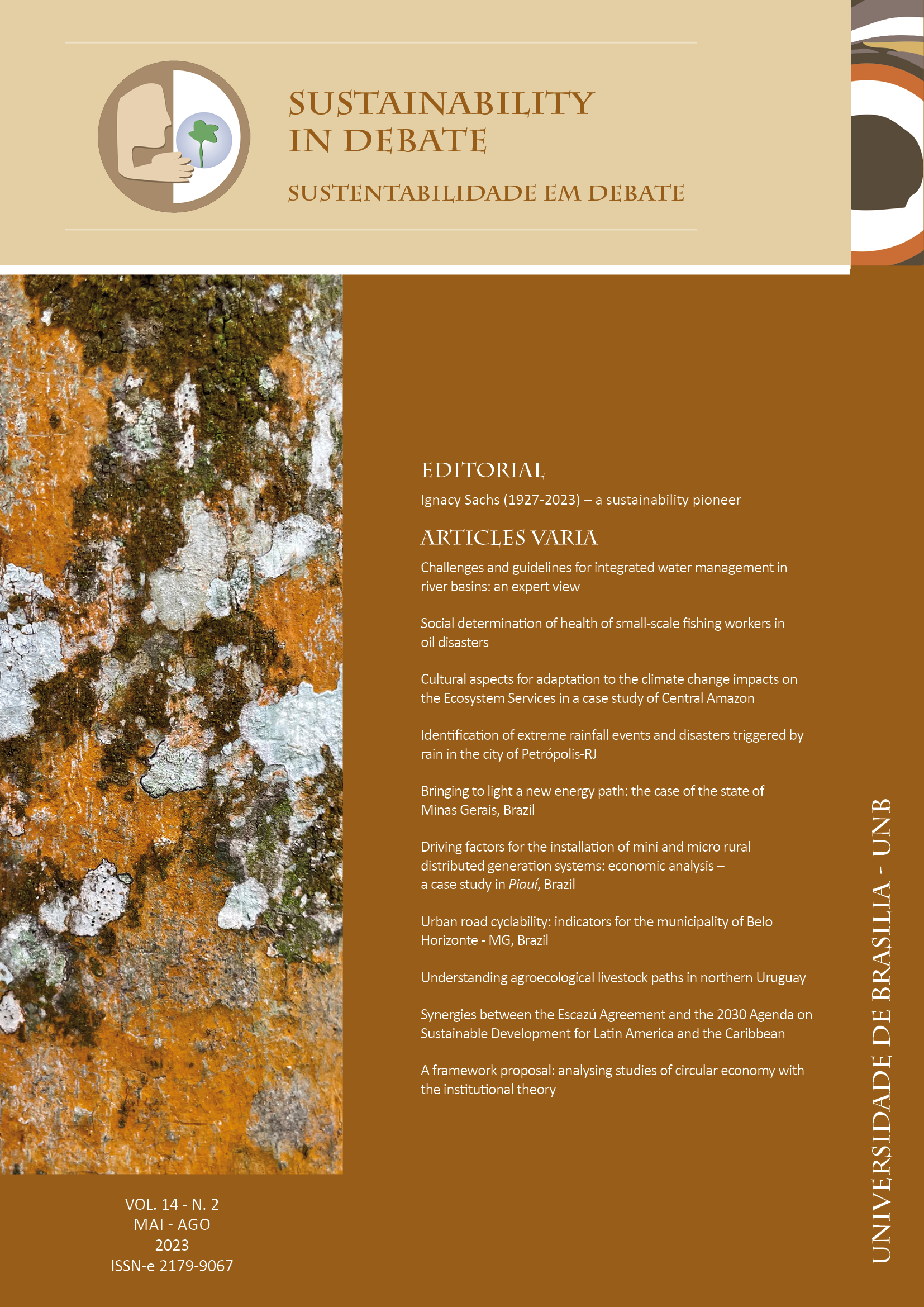
Sustainability in Debate
Vol. 14 Núm. 2 (2023)In this second issue of 2023, Sustainability in Debate pays tribute in its editorial to Ignacy Sachs (1927-2023), a pioneer in considering the environmental dimension as an inseparable attribute of the pursuit of development.
Subsequently, SiD publishes ten articles in the Varia section. Cerezini and Hanai discuss the challenges and guidelines for the integrated management of water in hydrographic basins; Gonçalves et al. discuss the relationship between dependence on fossil fuels, oil disasters, and the characterisation of the process of social determination of health in vulnerable territories. Canova et al. investigate how climate change has threatened the livelihood and cultural dimensions of peri- urban communities in Central Amazonia, while Fardin et al. discuss the identification of extreme rainfall events and disasters triggered by rain in Petrópolis-RJ. Ribeiro highlights the possibilities for energy generation from biomass in the state of Minas Gerais, while Silva et al. propose an approach to identify the determining factors for the insertion of mini and microsystems of distributed generation in the agricultural sector. Lobo and Pinto assess the level of road cyclability in Belo Horizonte-MG; Rivaben et al. debate agroecological paths for livestock in northern Uruguay; Muñoz-Ávlia and Guerrero discuss the main synergies between the Escazú Agreement and the 2030 Agenda, and Streit et al. propose a framework to analyse cases of implementation of the circular economy from the perspective of Institutional Theory.
-
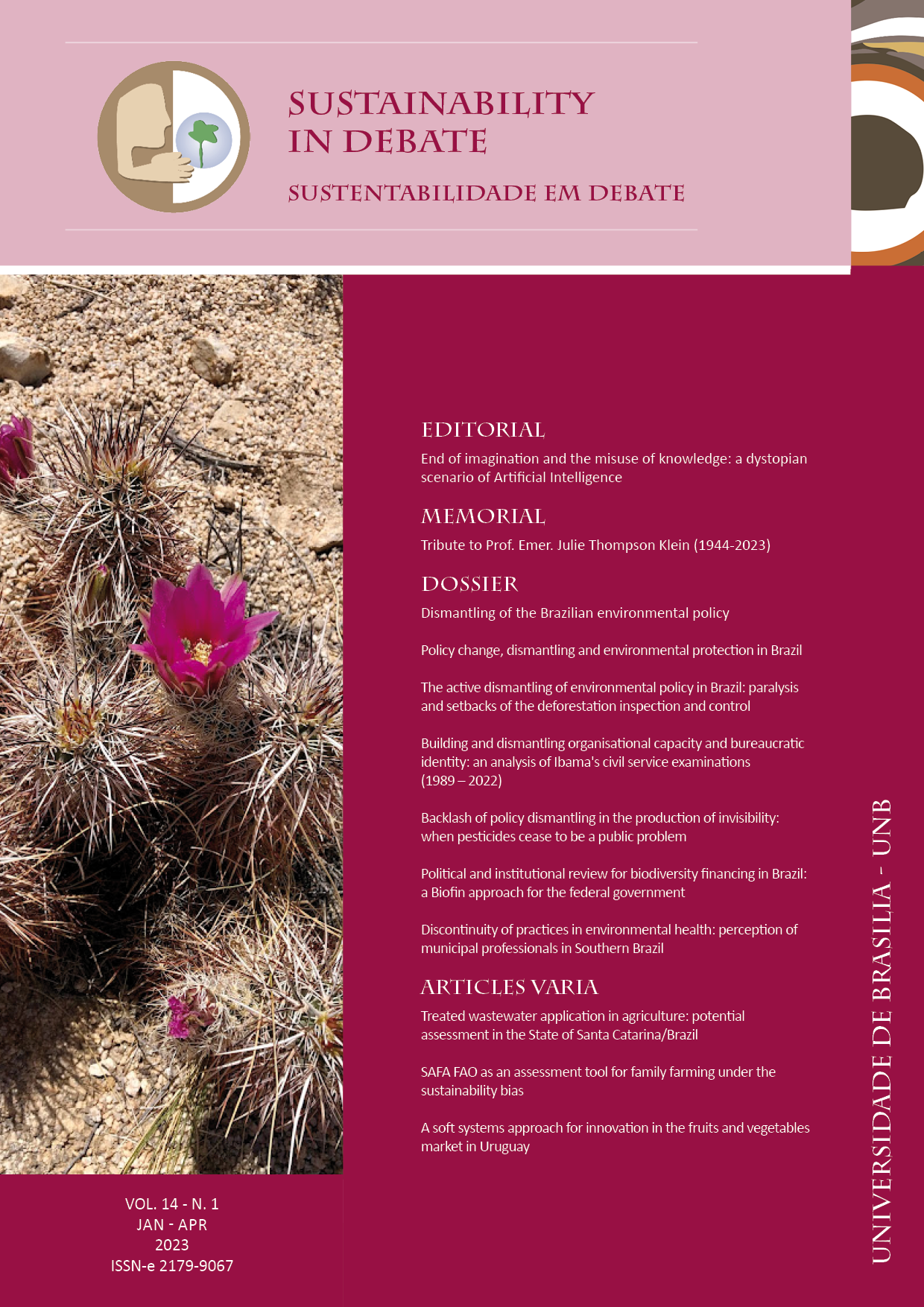
Sustainability in Debate
Vol. 14 Núm. 1 (2023)In this first issue of 2023, SiD, in its editorial, reflects on the (un)certainties and consequences of the rapid advance of artificial intelligence (A.I.), arguing that it might be the right time to extend the precautionary principle to this topic as well.
The Dossier "Dismantling of the Brazilian Environmental Policy" presents six articles, while the Varia section brings three additional articles. Additionally, SiD publishes a tribute note to the recently deceased Julie Thompson-Klein. The published articles evaluate the construction of Brazilian environmental policies and the recent abrupt changes. They also present the effects of former President Bolsonaro's administration on environmental analysts' actions in deforestation prevention and control policy in the Brazilian Legal Amazon. Besides, there is a discussion around Ibama's capacity and bureaucratic identity and a debate on dismantling the pesticide control policy. In addition, the political and institutional aspects that contributed, or did not, to funding biodiversity policies within the federal government and a discussion about the various difficulties in implementing environmental health actions in a municipality in southern Brazil are also presented. Finally, some articles discuss the potential use of treated sewage in the irrigation of crops produced in the state of Santa Catarina, a sustainability index (S.I.) of rural properties, and how the "soft system methodologies" contribute to building a representation of the different perspectives in the fruit and vegetable chain in Uruguay.
-
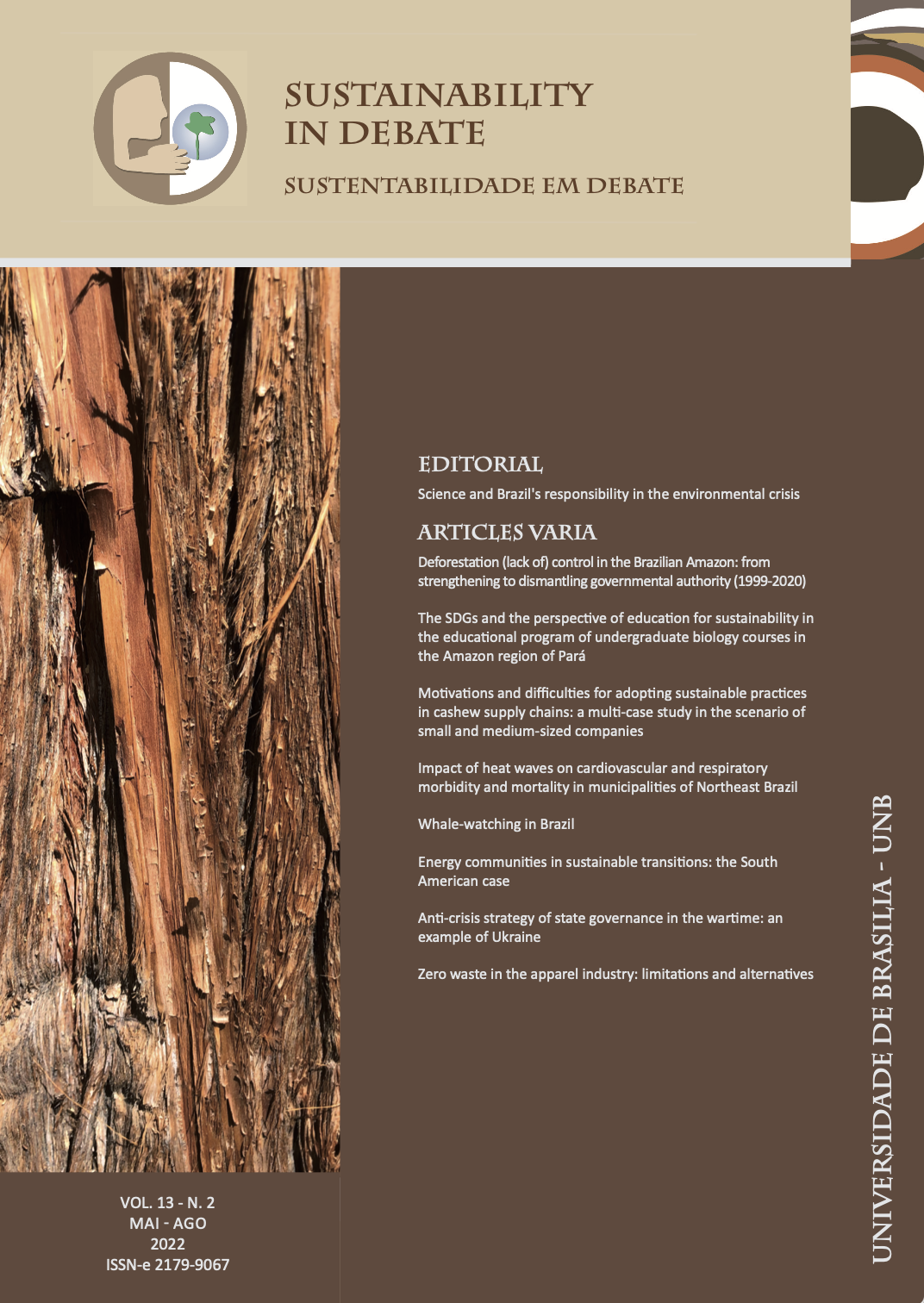
Sustainability in Debate
Vol. 13 Núm. 2 (2022)In this second edition of 2022, Sustainability in Debate's Editorial expresses a wake-up call, standing on circumstantial political aspects interrelated with the environmental crisis and reaffirming the role of open access scientific journals in the expansion of knowledge exchange. Science also needs to be democratized and sustainable, giving the entire scientific community access to the global production of knowledge that can contribute to making this world a better place.
In the Varia section, SiD publishes eight articles focused on the trajectory of construction and dismantling of forest policies in Brazil, specifically in the Amazon region; an investigation of the inclusion of Sustainable Development Goals in the Pedagogical Projects of Biology Degree Courses in the Amazon; a discussion on the motivations and difficulties in adopting sustainable practices in the supply chains of small and medium-sized companies in the cashew sector; an analysis of the impact of heat waves on the cardiovascular and respiratory health of a population in the Northeast region of Brazil; an investigation of cetacean observation tourism aiming to subsidize monitoring and inspection actions; the role of Energy Communities in promoting more sustainable, democratic and decentralized electrical systems; an analysis of the historical context of the establishment of the Ukrainian state, with a situational assessment of the current economic and environmental risks in Ukraine, in war times; and finally, an investigation of critical aspects and limitations of the creation and modelling process using the Zero Waste approach for application in the clothing industry.
-
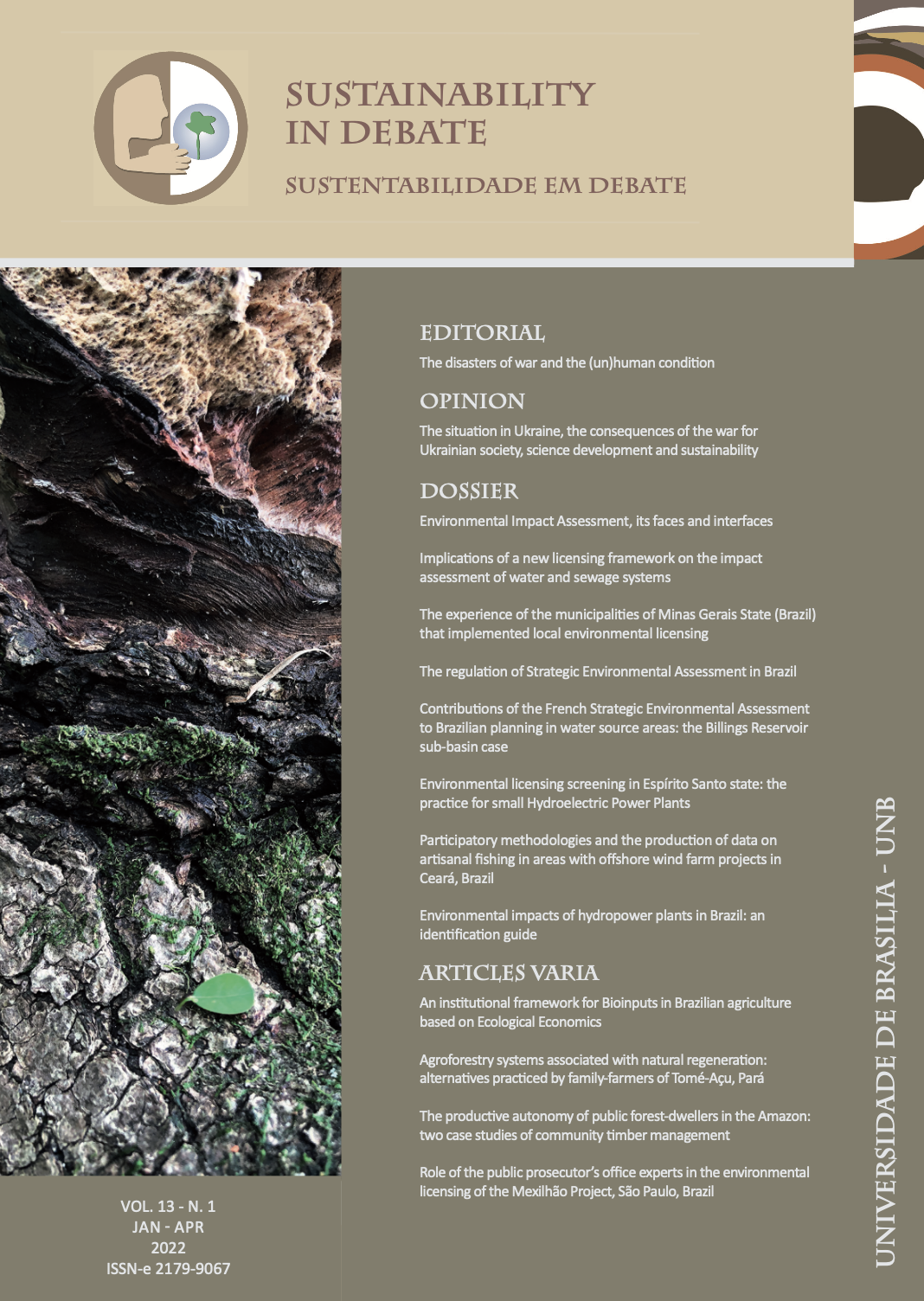
Sustainability in Debate
Vol. 13 Núm. 1 (2022)In this first edition of 2022, Sustainability in Debate's Editorial discusses the vast impacts of wars, beyond the social and economic ones, damaging the environment and the chances of a more sustainable world. A letter from three Ukrainian researchers who recently published an article with SiD manifests the repudiation of war and presents relevant information, which we believe to be of interest to our readers.
SiD also publishes a Dossier on "Environmental Impact Assessment, its faces and interfaces", with seven articles and four others in the Varia section.
The Dossier addresses the following topics: new licensing framework, environmental licensing of projects with local impact, evaluation of the regulation of Strategic Environmental Assessment, its contributions to a Development Plan and Environmental Protection, screening of the Environmental Licensing (EL) of Generating Plants, participatory methodologies in the construction of data on fishing activity, and guide to the identification of environmental impacts of hydroelectric projects.
In the Varia section, you will find the following topics: the institutional framework for bioinputs in Brazilian agriculture, the benefits of agroforestry systems associated with natural regeneration, the perception of traditional communities' autonomy in carrying out community-based forest management in conservation units, and performance analysis of experts from the Ministry public in the environmental licensing of a project.
-
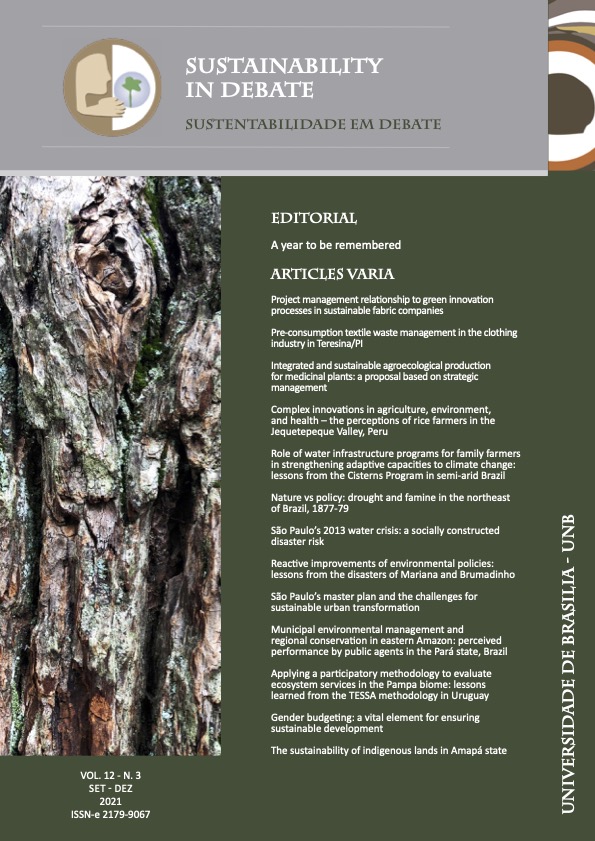
Sustainability in Debate
Vol. 12 Núm. 3 (2021)In this last issue of 2021, the Journal Sustainability in Debate – SiD discusses about one of the biggest lessons of the year, reaffirming the importance of systemic and collaborative thinking as the best way to address our current global crisis (related with the pandemic of Covid-19 and climate change). Overall, it is urged for greater solidarity in local communities through bottom-up coordinated network actions.
This issue presents 13 articles in the section Varia, dealing with the following topics: sustainability in the textile industry; relationship between project management and green innovation in sustainable fabric companies; pre-consumption textile waste management in the clothing industry; management plan based on integrated and sustainable agroecological production for medicinal plants; perceptions of rice farmers and the importance of integrated actions to promote complex innovations in agriculture; the role of water infrastructure programs for family farmers in strengthening adaptive capacities to climate change; assessment of the Great Drought in the northeast of Brazil; a discussion on the water crisis in Sao Paulo; reactive (and not proactive) improvement of environmental policies; São Paulo's master plan from the point of view of principles and guidelines for a compact city, sustainable adaptation and ecosystem-based adaptation; the link between environmental management at the municipal level and the regional conservation of the Eastern Amazon; lessons learned from a participatory methodology of ecosystem services assessment in the Uruguayan Pampa biome; approaches to introducing gender budgeting in countries; and the role of indigenous lands in the Amapá State for forest conservation.
-
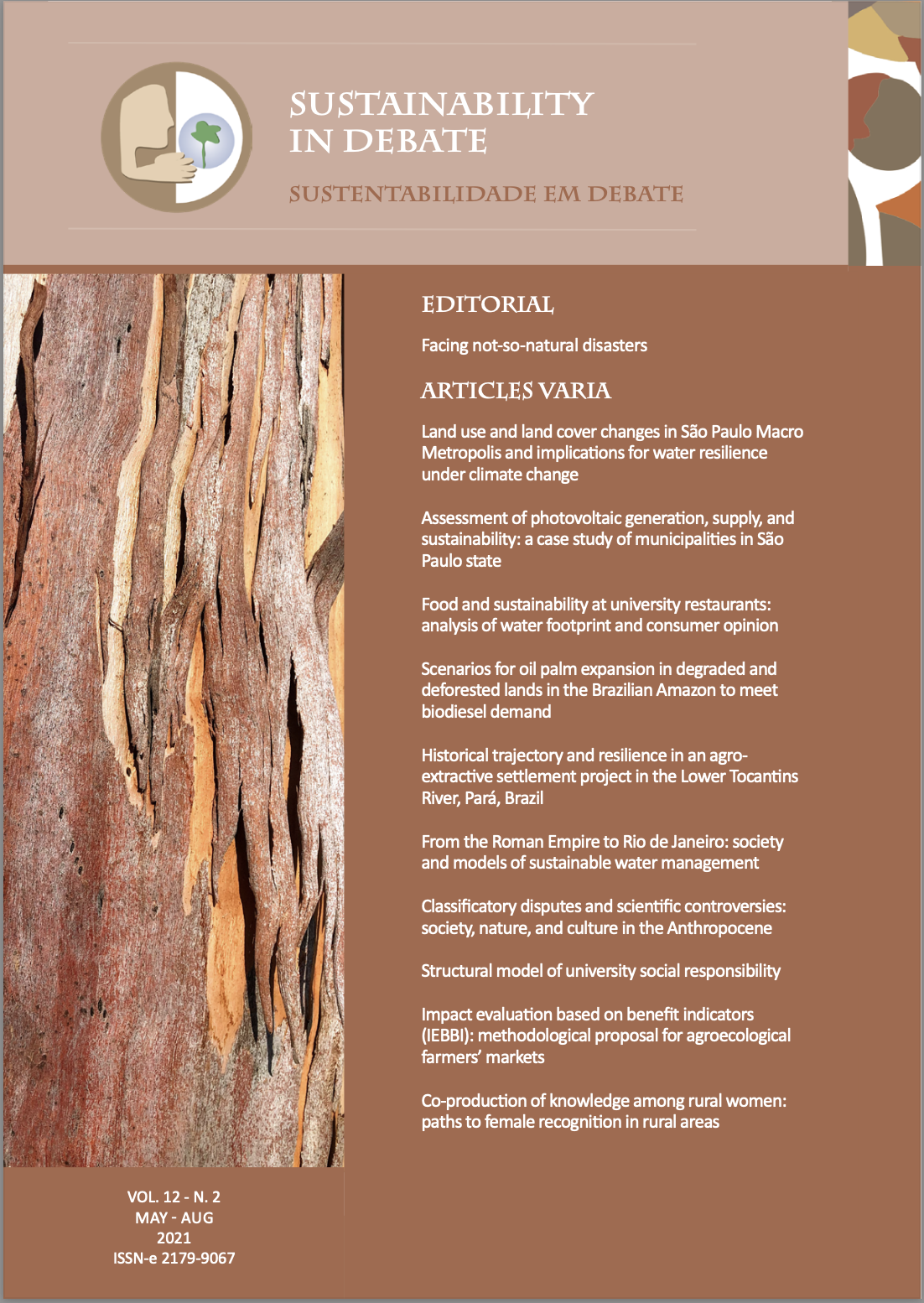
Sustainability in Debate
Vol. 12 Núm. 2 (2021)In this second edition of 2021, the Journal Sustainability in Debate - SiD warns about the need for more collective intelligence and actions. The urge is to cope with the various climate disasters observed in recent months and expected to be more frequent with global warming. Despite the technological and scientific advances in climatology, only predicting extreme events, such as heatwaves in Canada and torrential rains in China, do not avoid socioeconomic and environmental impacts. Thus, more coordinated action and commitment to implementing adaptation and mitigation measures to climate change are necessary. Besides the many lessons the Covid-19 pandemic gave us, the 2021 climate disasters also need to be seen as a lesson.
This edition of SiD presents a 10-article section Varia. They deal with the following topics: water crisis, photovoltaic energy, water footprint of food, scenarios for biodiesel expansion, resilience of agroextractive settlements, historical influence of ancient societies concerning water management, the concept of the Anthropocene, university social responsibility analysis, the impact assessment based on indicators of benefits of agroecological markets, and networks of dialogue as a tool for recognition of rural women.
-
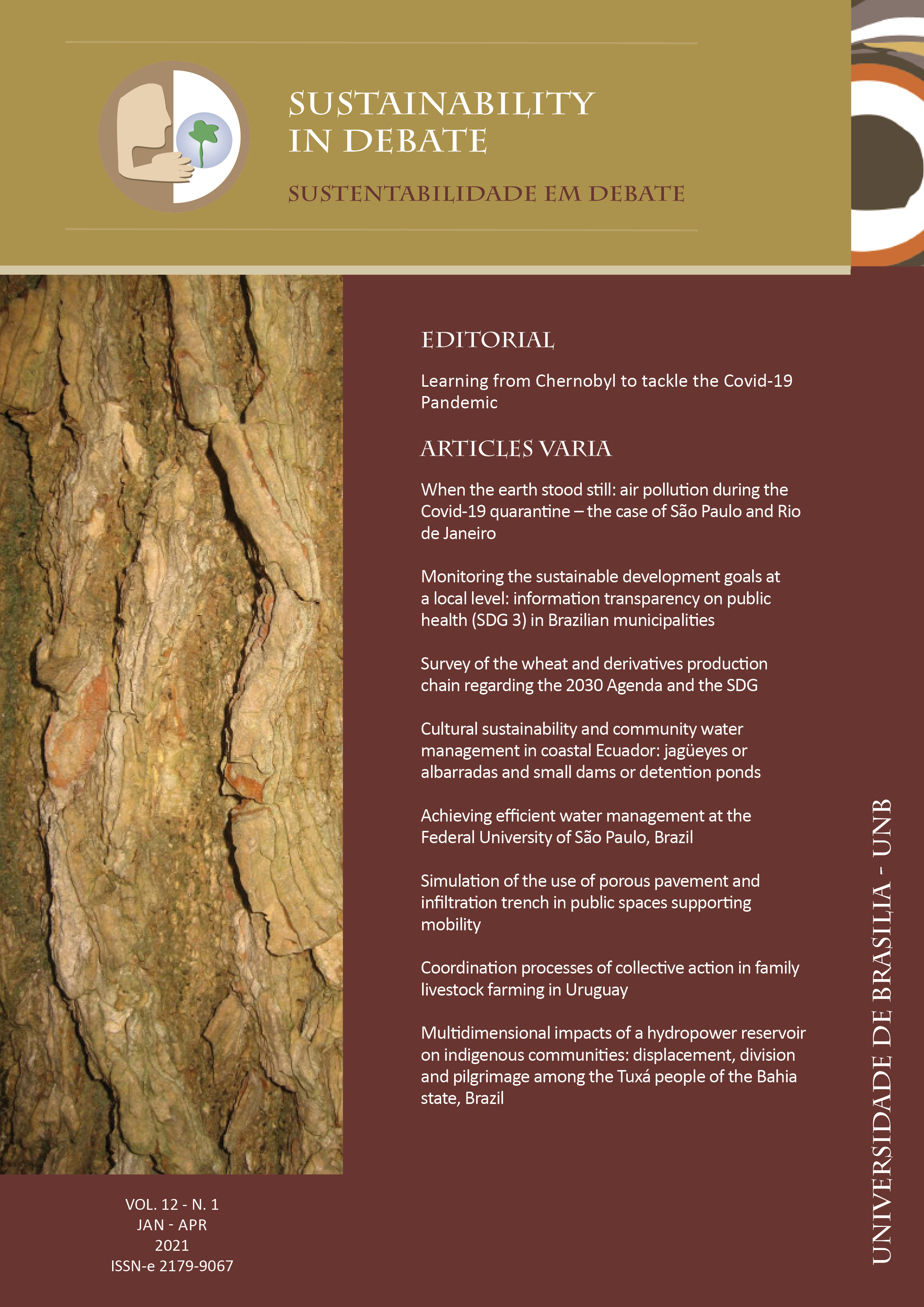
Sustainability in Debate
Vol. 12 Núm. 1 (2021)In this first edition of 2021, Sustainability in Debate warns about the importance of societies envisioning and caring about our planet as a single and interconnected environment. Besides, we highlight the need of visualizing that any damage to different territories echoes, to a greater or lesser degree, worldwide. The Covid-19 pandemic, as well as other past pandemics and environmental disasters, is offering us a new opportunity to reflect and internalize that we need to change our relationship with the environment. Thus, investing in science is increasingly vital to be alerted about the different interconnections, exposures and vulnerabilities. This knowledge generates collective intelligence in the construction of innovations and more harmonious relationships.
In this edition of SeD, eight articles are presented in the section Varia, which deal with the effects of the pandemic on the reduction of air pollution, the interface between different areas and the Sustainable Development Goals (SDGs), water resources, processes of coordination of collective actions, impacts of dams on Indigenous People, and a theoretical discussion on the concept of Anthropocene.
-
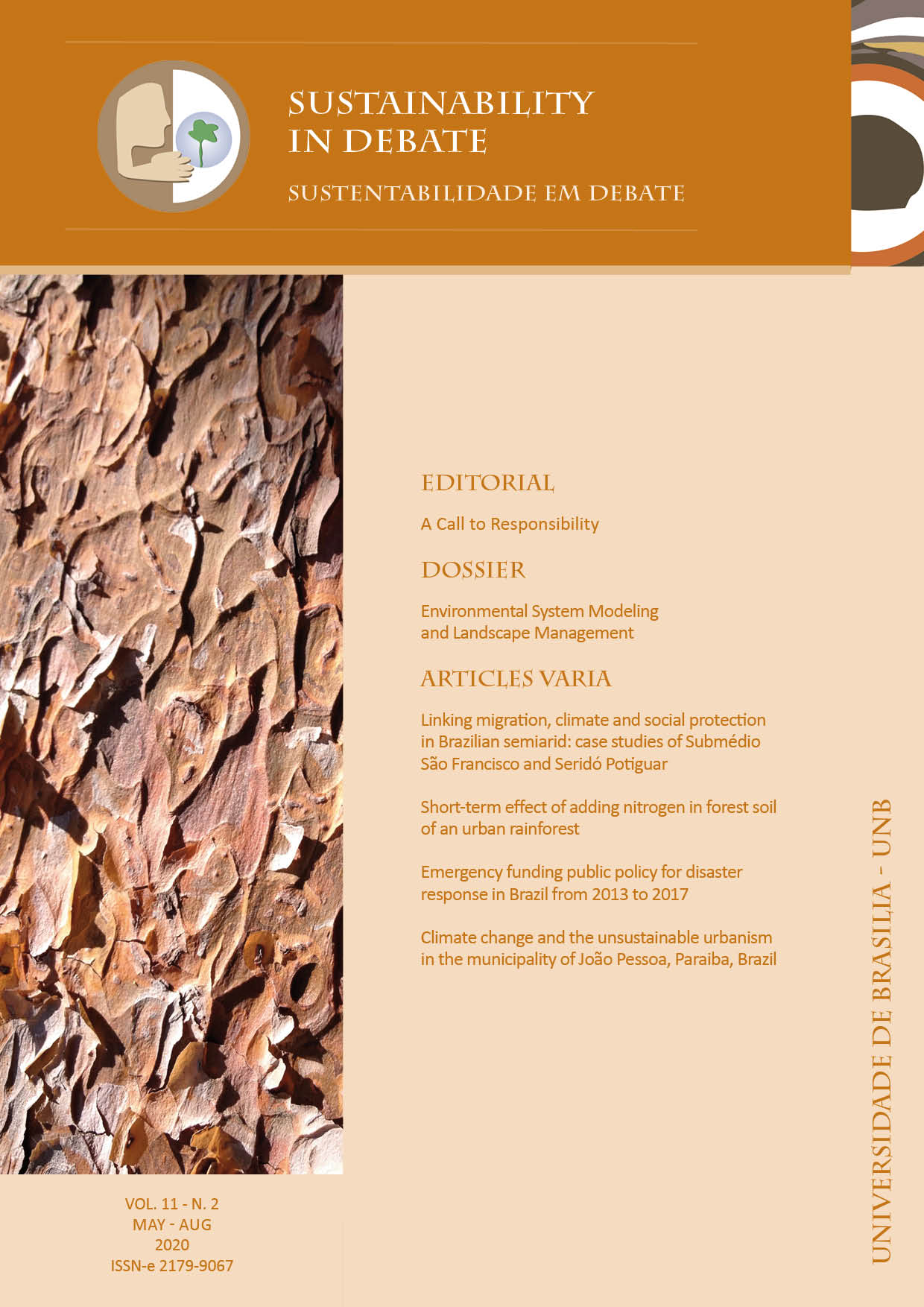
Sustainability in Debate
Vol. 11 Núm. 2 (2020)Sustainability in Debate / Sustentabilidade em Debate
-
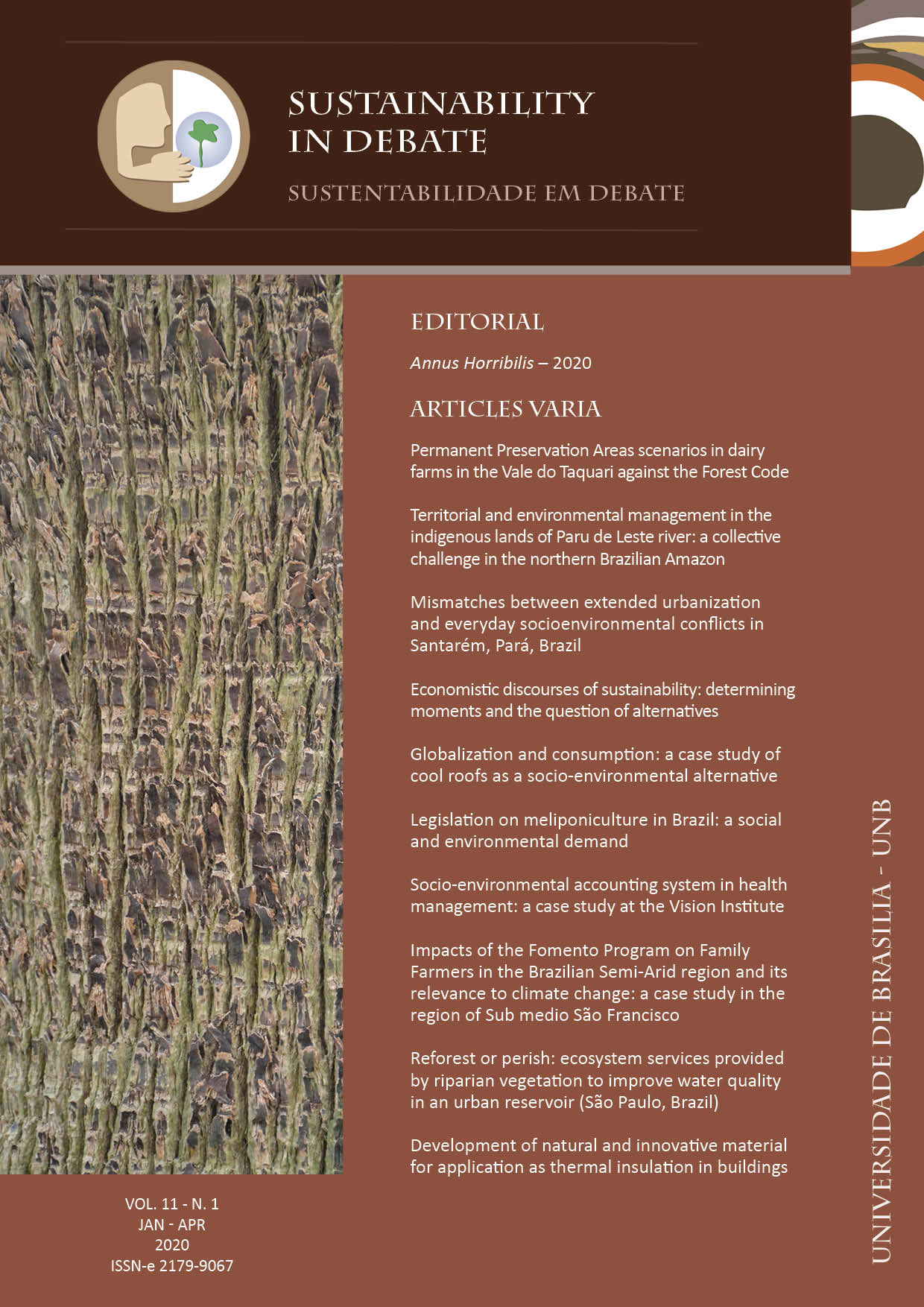
Sustainability in Debate
Vol. 11 Núm. 1 (2020)Sustainability in Debate / Sustentabilidade em Debate
-
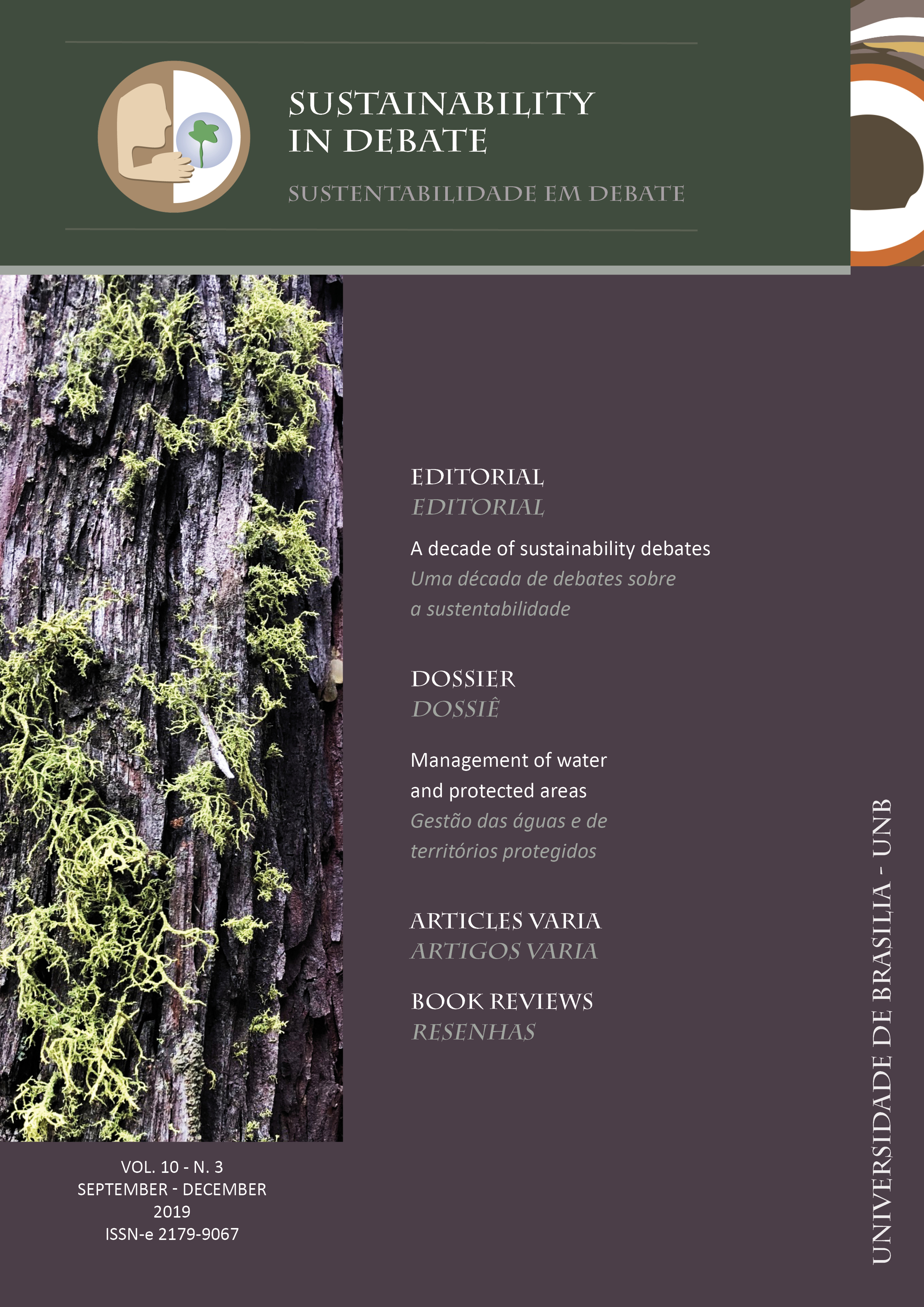
Sustainability in Debate
Vol. 10 Núm. 3 (2019)Sustainability in Debate / Sustentabilidade em Debate

